The Gospel of Luke
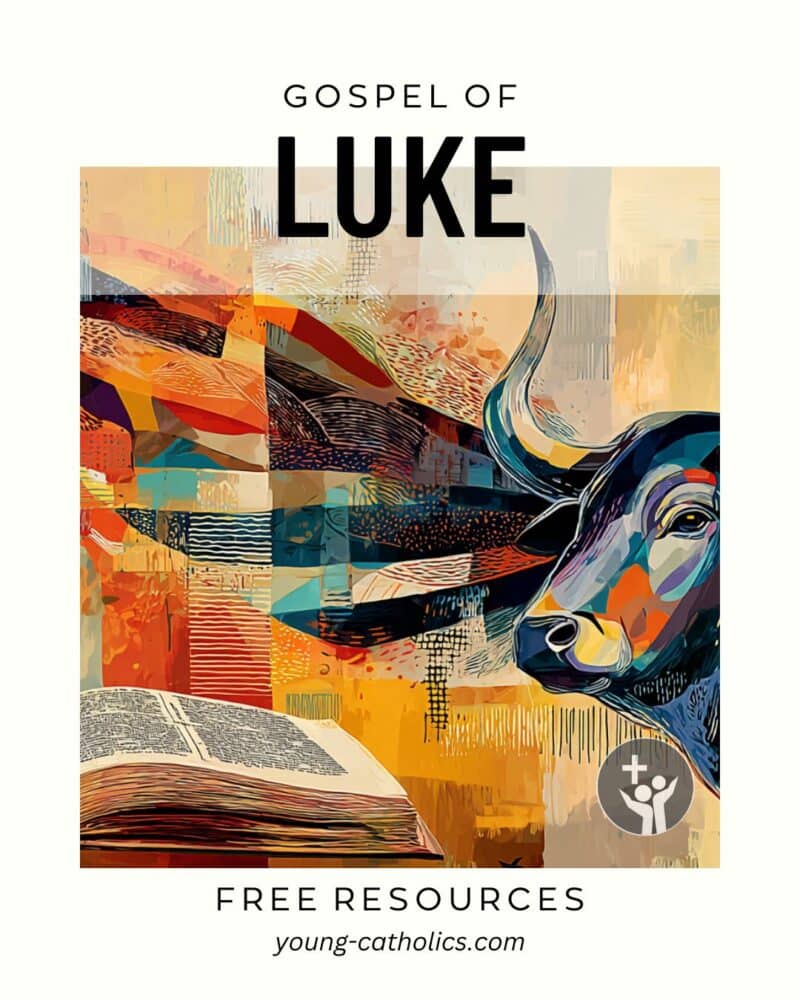
The Gospel of Luke tells the story of Jesus with care and kindness. Luke wanted to share the truth about Jesus so people would feel sure about what they believed. He addressed it to a man named Theophilus, but it was meant for everyone. Luke talked to many people and gathered stories to write his Gospel.
The name Theophilus means “friend of God” or “loved by God.” It comes from two Greek words: theos (God) and philos (friend or loved one). Some people think Theophilus was a real person, maybe someone important who helped support Luke’s work. Others think the name might have been a way to speak to any reader who loves God.
Luke shows that Jesus came for all people. He cared about the poor, the sick, and the forgotten. Luke often tells stories about people who were left out, like women, sinners, and outsiders. This Gospel reminds us that God’s love is for everyone, not just for a few.
Luke’s writing helps us see that Jesus brought hope. He came to heal, forgive, and welcome people. Luke talks a lot about joy, mercy, and the Holy Spirit. Many of the most loved stories of Jesus are found in this Gospel, like the Good Samaritan and the Prodigal Son.
Luke was also the author of the Acts of the Apostles. That book continues the story after Jesus rose from the dead. So, Luke helps us see the full picture—from Jesus’ birth, life, death, and resurrection to the growth of the early Church. His Gospel gives us a message of peace, healing, and new life.
Who Was Luke and When Did He Write?

Luke was a follower of Jesus who did not know Him in person. He was not one of the Twelve Apostles. But he traveled with Saint Paul and helped spread the message of Jesus. He is called “the beloved physician” in one of Paul’s letters, so many believe Luke was a doctor. He paid close attention to details and showed care for people.
Luke likely wrote his Gospel around the year 80 A.D., maybe a bit later. This was after the Temple in Jerusalem was destroyed in 70 A.D. Many Jews and Christians were struggling. Some were confused or afraid. Others were wondering when Jesus would return. Luke wrote to give them hope and help them understand the meaning of Jesus’ life, death, and resurrection.
Luke wrote for a mostly Gentile audience. These were people who were not born Jewish but had come to believe in Jesus. That’s why he explains Jewish customs and places in his Gospel. He wanted people from all backgrounds to feel included.
Luke also wrote the Acts of the Apostles. Together, these two books tell one long story—from Jesus’ birth to the growth of the early Church. Luke helps us see how the Holy Spirit worked through Jesus and then through His followers.
A Story Told with Care and Clarity
Luke writes like a careful storyteller. He wants the reader to understand, so he takes his time and adds details. His Gospel has a clear order. He begins with the birth of Jesus and ends with His resurrection and return to heaven. Luke also shares where things happen, who is involved, and what it means.
Luke uses simple stories which Jesus told to teach big truths. These are called parables. Some of the most loved ones are only in Luke—like the Good Samaritan, the Lost Sheep, and the Prodigal Son. These stories are easy to remember and full of meaning. They help us see how God loves and forgives.
Luke often uses pairs. He tells about two people or two events side by side. For example, he tells the story of Zechariah and Mary, or Simeon and Anna. This helps the reader compare and reflect on what is happening.
Luke also writes with joy. Songs and prayers are spread throughout the Gospel, like Mary’s song and the angels singing at Jesus’ birth. Luke wants the reader to feel the joy of the Good News. His writing is clear, kind, and full of hope.
A Gospel Full of Mercy and Joy
The Gospel of Luke has many themes that are important in Catholic teaching. These themes help us understand who Jesus is and what He calls us to do. Luke reminds us that the Good News is for everyone and that God’s love reaches every part of life.
One of the biggest themes is mercy. Luke shows how Jesus forgives sinners, welcomes outsiders, and heals the broken. The story of the Prodigal Son is a clear picture of God’s mercy. Catholic theology teaches that God always offers forgiveness to those who return to Him.
Another theme is care for the poor. Luke talks a lot about wealth, sharing, and justice. Mary’s song says that God lifts up the lowly. Jesus warns the rich not to ignore the poor. This connects with the Church’s teaching about the dignity of every person and the need to care for those in need. Luke’s Gospel supports Catholic work for social justice by calling us to build a world that is fair, peaceful, and full of mercy.
Other themes in Luke include:
- Joy and praise, seen in many songs and prayers
- The work of the Holy Spirit, from the beginning to the end
- The role of women, who are often named and honored
- Prayer and trust in God
- The mission to share the Gospel with the world
Luke’s Gospel teaches us how to live with mercy, faith, and joy. It invites us to follow Jesus and care for others just as He did.
A Gospel Told in Clear Parts
The Gospel of Luke is long, but it follows a clear path. It tells the story of Jesus from before His birth all the way to His resurrection. Each part has a focus. Knowing the sections can help readers understand how the story moves and grows.
Here is one way to divide the Gospel of Luke:
- Preparation for Jesus (Luke 1:1–2:52)
This part tells about the birth of John the Baptist and Jesus. It includes Mary’s visit to Elizabeth, Jesus’ birth in Bethlehem, and His visit to the temple as a child. - Beginning of Ministry (Luke 3:1–4:13)
John prepares the way. Jesus is baptized and faces temptations in the desert. - Ministry in Galilee (Luke 4:14–9:50)
Jesus teaches, heals, and calls His first disciples. He begins to show who He is through signs and stories. - Journey to Jerusalem (Luke 9:51–19:27)
Jesus starts His trip to the city where He will suffer and die. Along the way, He teaches many lessons and tells many parables. - Jesus in Jerusalem (Luke 19:28–21:38)
Jesus enters the city, clears the temple, and teaches there. He warns people and tells about the end times. - Passion and Death (Luke 22:1–23:56)
This part tells about the Last Supper, Jesus’ arrest, His trial, and His death on the cross. - Resurrection and New Life (Luke 24:1–53)
Jesus rises from the dead, appears to His followers, and returns to heaven.
Each part shows something new about who Jesus is and what He came to do. Luke helps the reader see the whole story clearly and with care.
Why the Gospel of Luke Still Matters Today
The Gospel of Luke is still very helpful for people today. It speaks to the world we live in. Many of the problems we see now—like poverty, injustice, and feeling left out—were also present in Luke’s time. Jesus shows us how to respond with love, mercy, and fairness.
Luke reminds us to care for the poor and welcome the stranger. That matters in a world where many people are still hurting or pushed aside. Jesus teaches us to look for those who are lost or forgotten and treat them like family.
Luke also shows us the joy of following Jesus. He includes songs, stories, and prayers that lift the spirit. His Gospel helps us feel hope even when things are hard. It reminds us that God is near and still working in the world.
For Catholics, Luke’s Gospel is a guide. It shows how to live the faith every day—with mercy, joy, prayer, and care for others. It is a message for all people, in every time.
Luke’s Gospel at Mass
The Gospel of Luke is used often in the Catholic Church. It appears in Sunday and weekday Mass readings. Each year, the Church focuses on one main Gospel for Sundays. Luke is the focus in Year C of the Sunday lectionary cycle.
During Year C, most of the Sunday Gospel readings come from Luke. This means the whole Church listens to his message for much of the liturgical year. His stories about mercy, joy, and care for the poor shape the prayers and lessons we hear.
Luke also shows up in special feast days. For example, we hear Luke’s account of Jesus’ birth at Christmas. His version of the Last Supper is read on Holy Thursday. We also hear the Emmaus story after Easter.
Hearing Luke’s Gospel at Mass helps Catholics learn how to follow Jesus. The readings guide us through the seasons of the Church year and help us grow in faith.
Click on a link below for details and free resources for a specific reading.
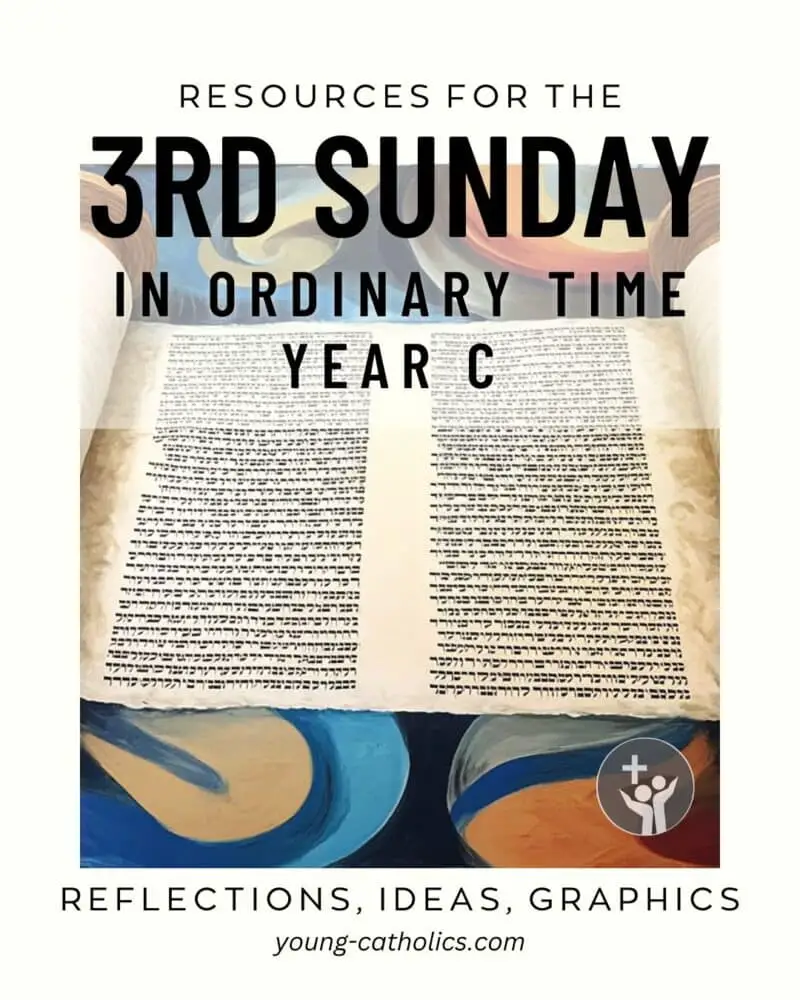
3rd Sunday in Ordinary Time Year C
The Good News Begins
In Luke 1:1-4 and 4:14-21, we see how the story of Jesus is introduced and how His mission begins. Luke explains that he wrote this account so people could know the truth about Jesus. He gathered what eyewitnesses shared to make sure the message was clear and trusted.
Later, Jesus returns to Galilee and goes to the synagogue in Nazareth. There, He reads from the scroll of Isaiah and tells the people that He has been sent to bring good news to the poor and freedom to the suffering. He announces that this message is being fulfilled through Him. This marks the start of His public ministry.

4th Sunday of Advent Year B
A Message from Heaven
In Luke 1:26-38, the angel Gabriel visits Mary in Nazareth. He tells her that she will have a child and name Him Jesus. Mary is confused and unsure, but she listens. Gabriel explains that the Holy Spirit will come to her and that her child will be called the Son of God.
Mary is also told that her relative Elizabeth is expecting a baby, even in her old age. This helps Mary understand that nothing is impossible for God. In the end, Mary says yes and agrees to do what God asks. This moment is the beginning of Jesus coming into the world through her.

4th Sunday of Advent Year C
A Joyful Visit
In Luke 1:39-45, Mary travels to visit her relative Elizabeth, who is also expecting a baby. As soon as Mary arrives and greets her, the baby in Elizabeth’s womb moves with joy. Elizabeth is filled with the Holy Spirit and understands that Mary is carrying the Savior.
Elizabeth praises Mary for believing what God told her. She feels blessed to be visited by the mother of the Lord. This meeting shows the deep joy and faith shared between the two women. It also shows how God is already at work through both of their children.
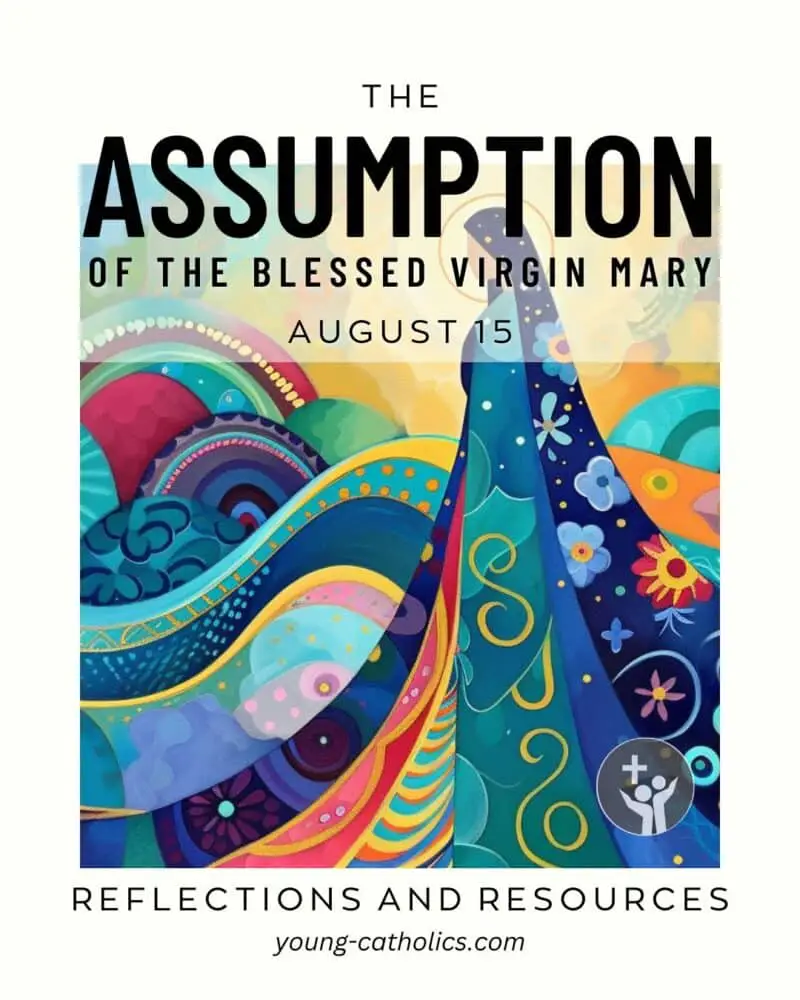
The Assumption of the Blessed Virgin Mary
A Joyful Visit and a Song of Praise
In Luke 1:39-56, Mary travels to visit her cousin Elizabeth. When Mary arrives, Elizabeth is filled with the Holy Spirit and praises her. She calls Mary blessed and honors her for trusting God’s promise. Even the baby in Elizabeth’s womb, John the Baptist, leaps with joy at Mary’s greeting.
Mary then praises God in a joyful song. She thanks Him for choosing her and helping His people. She remembers how God lifts up the lowly and feeds the hungry. Her words show her deep trust in God’s goodness. Mary stays with Elizabeth for three months before returning home.

3rd Sunday of Advent Year B – Gaudete Sunday
Joy from a Grateful Heart
Luke 1:46-48, 49-50, 53-54 is part of Mary’s prayer of joy and thanks. She praises God for choosing her, even though she is small and humble. She sees that God has done something great in her life. She is full of joy because God has kept His promises and shown her kindness.
Mary also speaks about how God helps others. He lifts up the poor, feeds the hungry, and cares for His people. She remembers that God’s mercy never ends. Her song reminds us to trust that God still works in the world and still keeps His promises to us today.

The Nativity of the Lord: Christmas (Mass at Midnight)
The Birth of Jesus
In Luke 2:1-14, Joseph and Mary travel to Bethlehem for a census. While they are there, Mary gives birth to Jesus. She lays Him in a manger because there is no room in the inn. This quiet moment happens in a small town, far from any palace or crowd.
Nearby, shepherds are in the fields at night. An angel appears to them with news of great joy: a Savior has been born. Then a whole group of angels joins in, praising God and saying there will be peace on earth. This shows that Jesus came for all people, starting with the lowly and poor.
The Nativity of the Lord: Christmas (Mass at Dawn)
The Shepherds Visit the Newborn King
In Luke 2:15-20, the shepherds hurry to Bethlehem after the angels leave. They find Mary, Joseph, and the baby Jesus lying in the manger, just as they were told. They are amazed and full of joy.
After seeing the child, the shepherds go out and tell others what they saw and heard. People are surprised by their story. Mary keeps these things in her heart and thinks about them. The shepherds return to their fields, praising God for all they had seen.

Blessed Virgin Mary, the Mother of God
Mary Treasures Every Moment
In Luke 2:16-21, the shepherds go quickly and find Mary, Joseph, and the baby Jesus lying in the manger. They share what the angels told them about the child. Everyone who hears their story is amazed, but Mary stays quiet and reflects on all these things in her heart.
The shepherds return, giving thanks and praise to God for what they saw. Eight days after His birth, the baby is named Jesus, just as the angel said before He was born. This moment honors both the birth of Jesus and Mary’s special role as His mother.

The Presentation of the Lord
A Child Welcomed with Joy
In Luke 2:22-40, Mary and Joseph bring Jesus to the temple in Jerusalem to offer Him to God. While there, they meet Simeon, a faithful man who was waiting to see the Savior. He takes Jesus in his arms and praises God, knowing that God’s promise has been fulfilled.
They also meet Anna, a prophet who prays in the temple every day. She gives thanks and speaks about Jesus to others. After this, Mary and Joseph return home to Nazareth. Jesus grows strong and wise, and God’s favor is with Him. This moment shows how Jesus is welcomed and recognized by those who have waited in faith.

Holy Family of Jesus, Mary, and Joseph Year B
Faith and Family at the Temple
In Luke 2:22-40, Mary and Joseph bring Jesus to the temple to present Him to God, following the law of Moses. While there, they meet Simeon, a man led by the Holy Spirit. He recognizes Jesus as the Savior and praises God. Simeon also tells Mary that her child will face great things, and her own heart will be pierced.
Anna, a holy woman who spends her days in prayer, also sees Jesus and speaks about Him to others. Mary and Joseph return to Nazareth, and Jesus grows in strength and wisdom. This reading reminds us that the Holy Family followed their faith with care and trust.
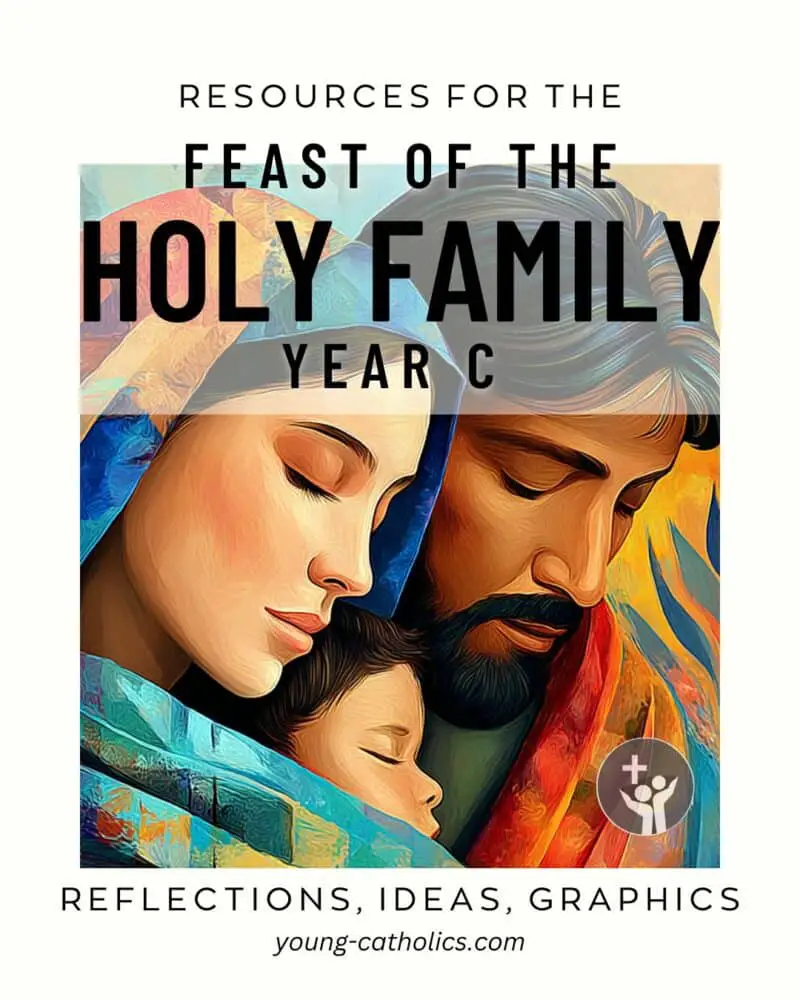
Holy Family of Jesus, Mary, and Joseph Year C
Jesus in His Father’s House
In Luke 2:41-52, Mary and Joseph travel to Jerusalem with Jesus for the feast of Passover. On the way home, they realize Jesus is missing. After three days, they find Him in the temple, sitting with the teachers and asking questions. Everyone is surprised by His wisdom.
Mary asks why He stayed behind. Jesus answers that He must be in His Father’s house. They don’t fully understand, but they bring Him back to Nazareth. Jesus obeys them and grows in wisdom and grace. This story shows Jesus becoming aware of His special mission, while still living with love and respect in His family.

2nd Sunday of Advent Year C
Preparing the Way
In Luke 3:1-6, John the Baptist begins his mission in the desert. He preaches a message of repentance and calls people to change their lives. He baptizes them in the Jordan River as a sign that they want to turn back to God.
John’s work fulfills what the prophet Isaiah said long ago. A voice would call out in the desert, making a path ready for the Lord. John helps the people get ready to meet Jesus by calling them to clear away what keeps them far from God.

3rd Sunday of Advent Year C – Gaudete Sunday
Live with Justice and Kindness
In Luke 3:10-18, the people ask John the Baptist what they should do to follow God. He gives simple answers. Share what you have. Be fair. Do not take more than what is right. He tells everyone to act with honesty and care, no matter their job.
Some wonder if John is the Messiah. But he explains that someone greater is coming. He says that Jesus will baptize with the Holy Spirit. John’s words bring hope and challenge. He teaches the people how to prepare their hearts and live in a better way.

Baptism of the Lord Year C
Jesus Is Baptized
In Luke 3:15-16, 21-22, the people wonder if John the Baptist might be the Messiah. John tells them someone greater is coming. He says that while he baptizes with water, the one coming will baptize with the Holy Spirit.
Later, Jesus is baptized along with many others. As He prays, the heavens open and the Holy Spirit comes down like a dove. A voice from heaven says that Jesus is God’s Son. This moment shows that Jesus is ready to begin His mission.

1st Sunday of Lent Year C
Tested in the Desert
In Luke 4:1-13, Jesus goes into the desert for forty days. He eats nothing during that time. The devil tries to tempt Him three times. Each time, Jesus refuses and stays faithful to God.
The devil offers food, power, and a test of God’s care. Jesus answers with words from Scripture. He shows that trusting God is more important than comfort, fame, or control. When the devil leaves, Jesus is ready to begin His public ministry.

4th Sunday in Ordinary Time Year C
Rejected at Home
In Luke 4:21-30, Jesus speaks in the synagogue in His hometown. At first, the people are amazed. But when Jesus reminds them that God’s blessings have also gone to outsiders in the past, they become angry.
They do not want to hear that God’s message is for others too. The crowd becomes so upset that they try to drive Him out of town. But Jesus walks away safely. This shows how hard it can be to speak the truth, even to people we know well.
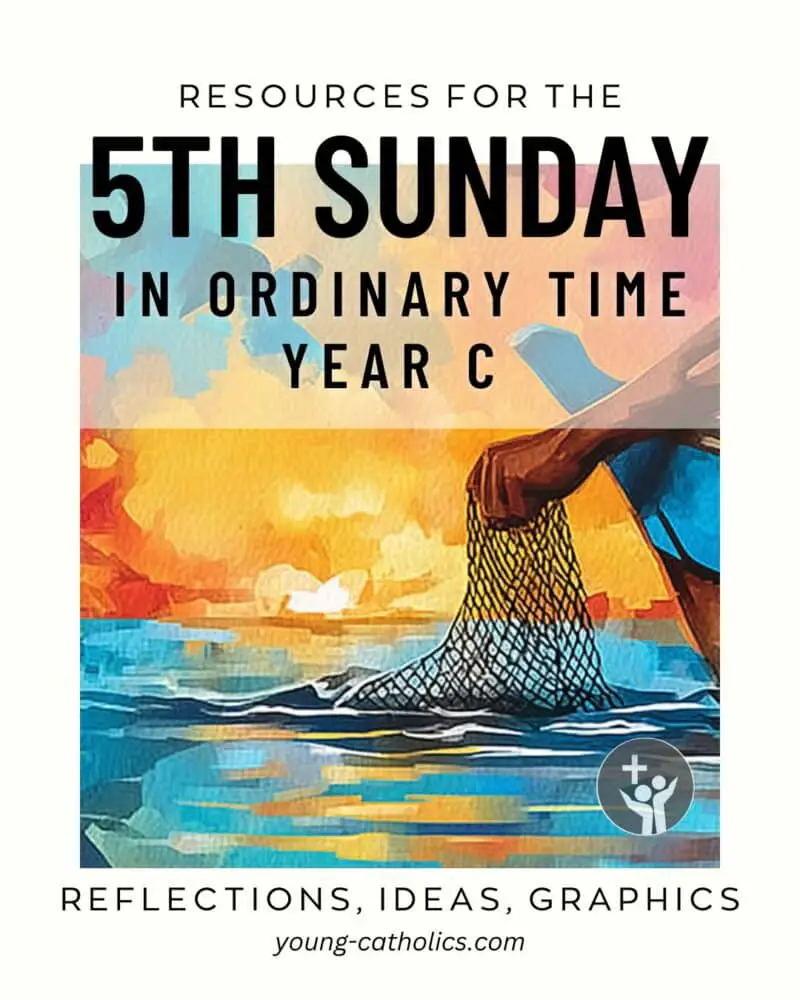
5th Sunday in Ordinary Time Year C
Called to Follow
In Luke 5:1-11, Jesus teaches by the lake while people crowd around Him. He gets into Simon’s boat and asks him to go out a little from the shore. After teaching, Jesus tells Simon to lower the nets, even though they had caught nothing all night.
When Simon obeys, they catch so many fish that the nets begin to tear. Simon feels unworthy, but Jesus tells him not to be afraid. From now on, he will catch people instead of fish. Simon, James, and John leave everything behind and follow Jesus. This marks the start of their mission.

6th Sunday in Ordinary Time Year C
Blessings and Warnings
In Luke 6:17, 20-26, Jesus teaches a large crowd of people. He speaks directly to His disciples and tells them who is blessed in God’s eyes. The poor, the hungry, and those who are sad or rejected will receive comfort and joy.
Jesus also gives warnings. He says people who are rich, full, or praised now should be careful. Things may not stay that way. This teaching turns many common ideas upside down. Jesus helps the people see that God’s way is different from the world’s way.

7th Sunday in Ordinary Time Year C
Love Without Limits
In Luke 6:27-38, Jesus tells His followers to love their enemies and do good to those who hurt them. He says to turn the other cheek, give freely, and treat others the way you want to be treated. This teaching is hard, but it shows how different God’s way is.
Jesus reminds them not to judge or condemn others. Instead, He tells them to forgive and be generous. The more love and mercy we give, the more we will receive. This reading teaches us to live with kindness, patience, and open hearts.

8th Sunday in Ordinary Time Year C
Look at Your Own Heart First
In Luke 6:39-45, Jesus teaches that a blind person cannot lead another blind person. He says we must first take the problem out of our own lives before pointing out what others are doing wrong. This helps us stay humble and honest.
Jesus also says that good trees produce good fruit. A person’s actions show what is in their heart. If someone speaks with kindness and lives with love, it means their heart is good. This reading reminds us to check our own lives and choose what is good and true.

9th Sunday in Ordinary Time Year C
Faith from a Distance
In Luke 7:1-10, a Roman centurion sends messengers to Jesus to ask for help. His servant is very sick and near death. The centurion says he is not worthy for Jesus to come to his home, but he believes Jesus can heal just by speaking a word.
Jesus is amazed at the man’s faith. Even though the centurion is not Jewish, he trusts fully in Jesus. When the messengers return, they find the servant healed. This story shows that true faith can come from anyone and that Jesus responds to trust and humility.

10th Sunday in Ordinary Time Year C
A Mother’s Tears and a Miracle
In Luke 7:11-17, Jesus enters a town called Nain and sees a funeral. A widow is burying her only son. She is filled with sorrow. Jesus feels compassion and goes to help without being asked.
He tells the young man to rise, and the dead boy sits up and begins to speak. The people are amazed and begin praising God. News of this miracle spreads quickly. This story shows that Jesus notices those who are hurting and brings hope when all seems lost.

11th Sunday in Ordinary Time Year C
Forgiveness and Following
In Luke 7:36–8:3, Jesus visits the home of a Pharisee. A woman known as a sinner comes in and shows great care for Jesus. She washes His feet with her tears and dries them with her hair. The Pharisee is surprised, but Jesus explains that her love shows how much she has been forgiven.
Jesus then speaks about how those who are forgiven much, love much. After this, several women who were healed by Jesus begin to follow Him. They help support His ministry. This reading shows that Jesus welcomes sinners and values those who follow Him with love and service.

Corpus Christi Year C
Food for the Crowd
In Luke 9:11B-17, a large crowd follows Jesus. He welcomes them, teaches them, and heals those who are sick. As the day ends, the disciples want to send the people away to find food. But Jesus tells them to give the crowd something to eat.
They only have five loaves of bread and two fish. Jesus blesses the food, and the disciples hand it out. Everyone eats and there is plenty left over. Twelve baskets of leftovers are gathered. This shows how Jesus cares for both the body and spirit of the people.

12th Sunday in Ordinary Time Year C
Who Do You Say I Am?
In Luke 9:18-24, Jesus asks His disciples what people are saying about Him. They tell Him that some think He is a prophet. Then Jesus asks them directly, and Peter answers that Jesus is the Messiah. Jesus tells them not to share this yet.
He explains that He will suffer, be rejected, and die—but will rise again. Then He says that anyone who wants to follow Him must take up their cross each day. They must be willing to give up their own way of life to truly follow Him.

2nd Sunday of Lent Year C
A Glimpse of Glory
In Luke 9:28B-36, Jesus takes Peter, James, and John up a mountain to pray. While He is praying, His appearance changes, and His clothes become bright. Moses and Elijah appear and talk with Him about what will happen in Jerusalem.
Peter wants to stay there and build shelters, but a cloud covers them, and they hear a voice from heaven telling them to listen to Jesus. Then everything returns to normal, and they keep silent about what they saw. This moment helps the disciples see that Jesus is truly sent by God.

13th Sunday in Ordinary Time Year C
Following Jesus Without Holding Back
In Luke 9:51-62, Jesus begins His journey to Jerusalem. He sends messengers ahead, but some people in a village do not welcome Him. When His disciples want to call down fire in anger, Jesus tells them no and continues on.
As they travel, people say they want to follow Jesus. But Jesus reminds them that following Him means giving up comfort and not looking back. He asks for full commitment. This reading shows that being a disciple takes trust, courage, and a willingness to let go of other things.
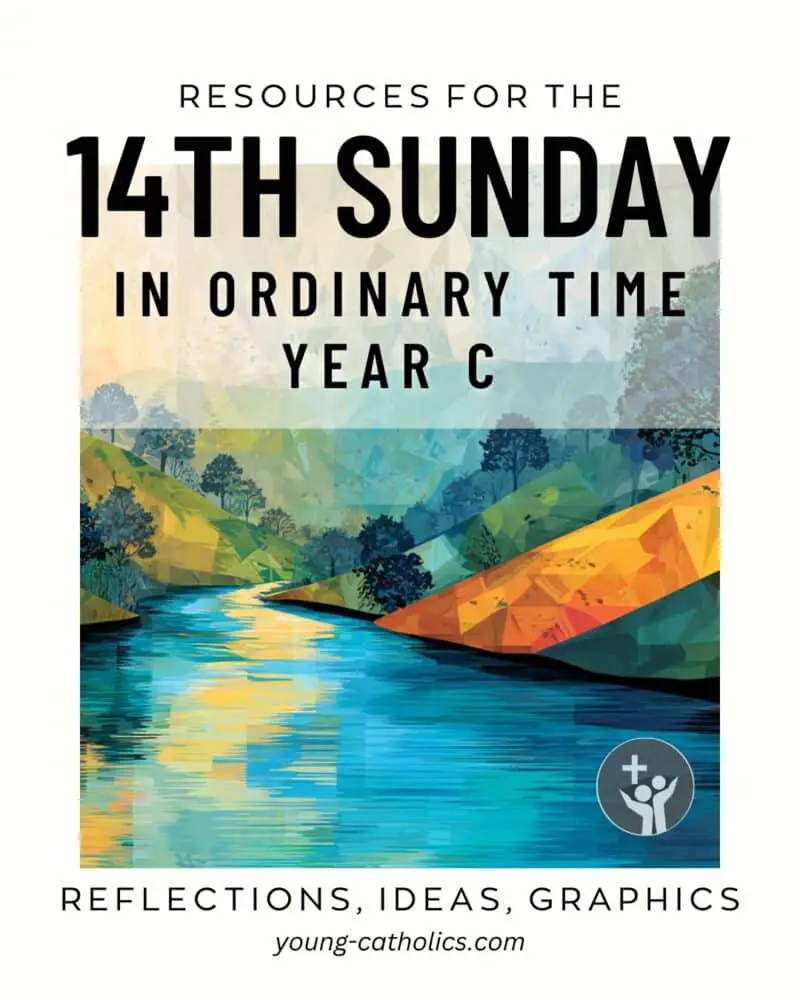
14th Sunday in Ordinary Time Year C
Sent to Share the Good News
In Luke 10:1-12, 17-20, Jesus sends out seventy-two followers in pairs to visit towns and prepare the way for Him. He tells them to travel simply, bring peace, and heal the sick. If people welcome them, they should stay and share the Good News. If not, they should move on without anger.
When the followers return, they are excited that even evil spirits listened to them. Jesus tells them He saw Satan fall. But He reminds them that the greatest joy is not in power, but in knowing their names are written in heaven. Their mission is about faith and trust, not fame or control.
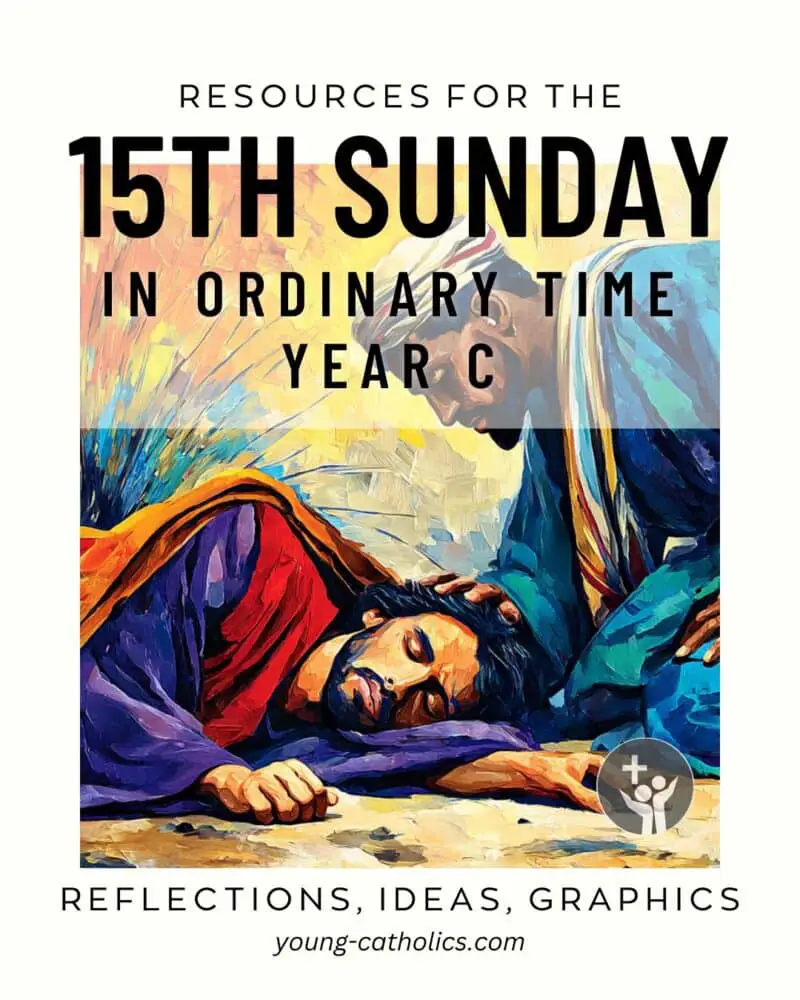
15th Sunday in Ordinary Time Year C
Who Is My Neighbor?
In Luke 10:25-37, a man asks Jesus what he must do to gain eternal life. Jesus helps him see that the answer is to love God and love your neighbor. Then the man asks, “Who is my neighbor?” So Jesus tells the story of a man who is attacked by robbers and left on the road.
A priest and a Levite pass by without helping. But a good Samaritan, someone from a group often disliked by the Jews, stops to help. He cares for the man and pays for his needs. Jesus ends by saying that we should act like the Samaritan. Everyone in need is our neighbor.
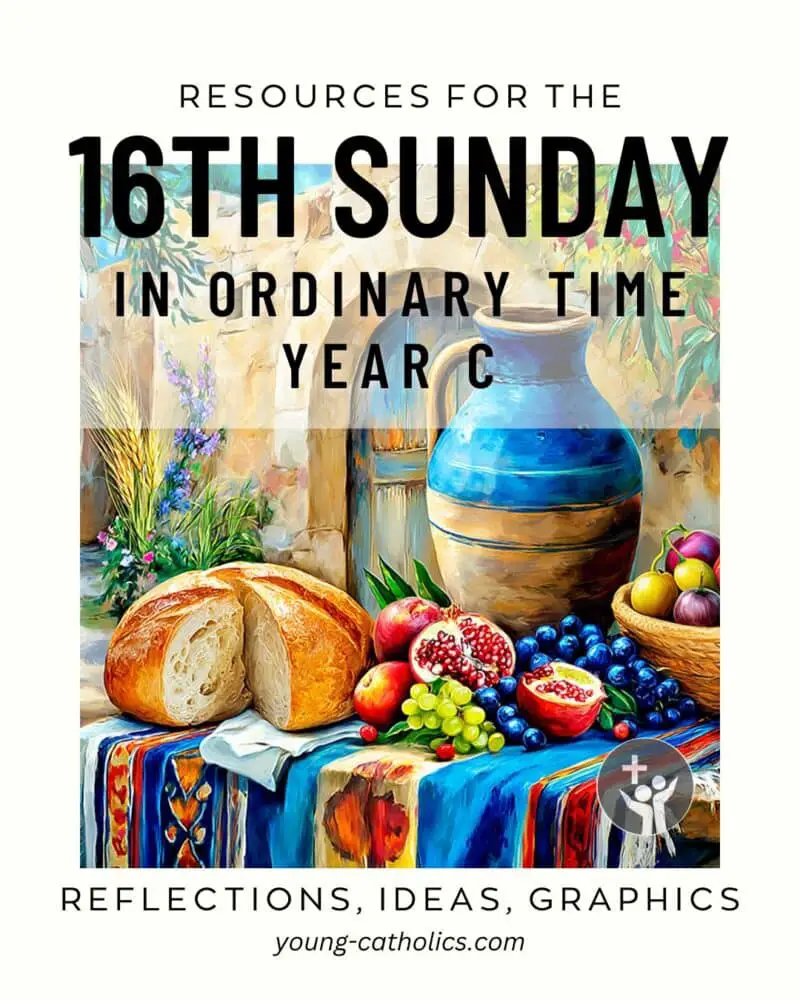
16th Sunday in Ordinary Time Year C
Listening Comes First
In Luke 10:38-42, Jesus visits the home of two sisters, Martha and Mary. Martha is busy with serving and feels upset that Mary is not helping. She asks Jesus to tell Mary to help her.
But Jesus says that Mary has chosen what is better. She is sitting and listening to Him. Martha’s work is good, but sometimes we need to stop and focus on Jesus. This reading reminds us to make time for prayer and quiet, not just action.
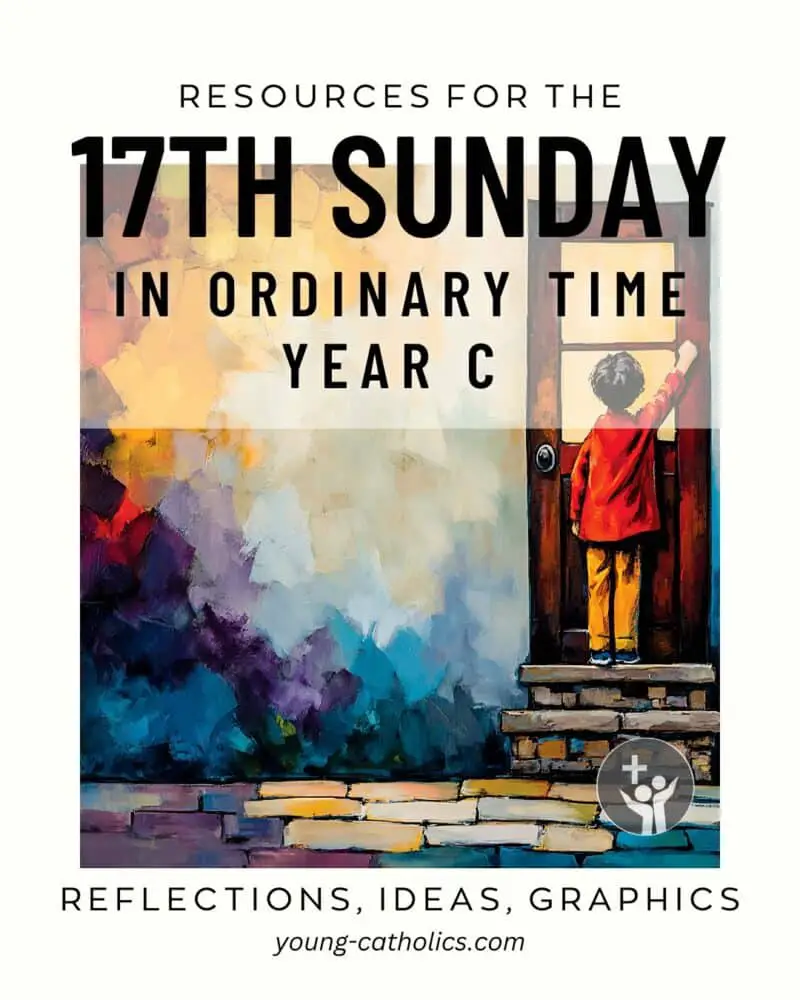
17th Sunday in Ordinary Time Year C
Teach Us to Pray
In Luke 11:1-13, the disciples ask Jesus to teach them how to pray. He gives them a simple prayer that praises God, asks for daily needs, and asks for forgiveness. This becomes the Lord’s Prayer, which Catholics still pray today.
Jesus also tells a story about a man who keeps asking his neighbor for help until he gets what he needs. Then He explains that we should keep asking, seeking, and knocking. God listens and gives good things, especially the Holy Spirit, to those who ask with trust.

The Assumption of the Blessed Virgin Mary
True Blessing in Action
In Luke 11:27-28, a woman praises Mary for being the mother of Jesus. She thinks Mary is special because she gave birth to Jesus. Jesus answers her in a surprising way. He says the real blessing comes from hearing God’s word and doing what it says. It’s not about family ties or who you know. It’s about living God’s teachings.
Jesus teaches that everyone can be blessed by God. All people have the chance to listen to God’s word and obey it. Mary is honored because she did just that. She always listened to God and followed His plan. Jesus reminds us that being close to God means acting on His words.
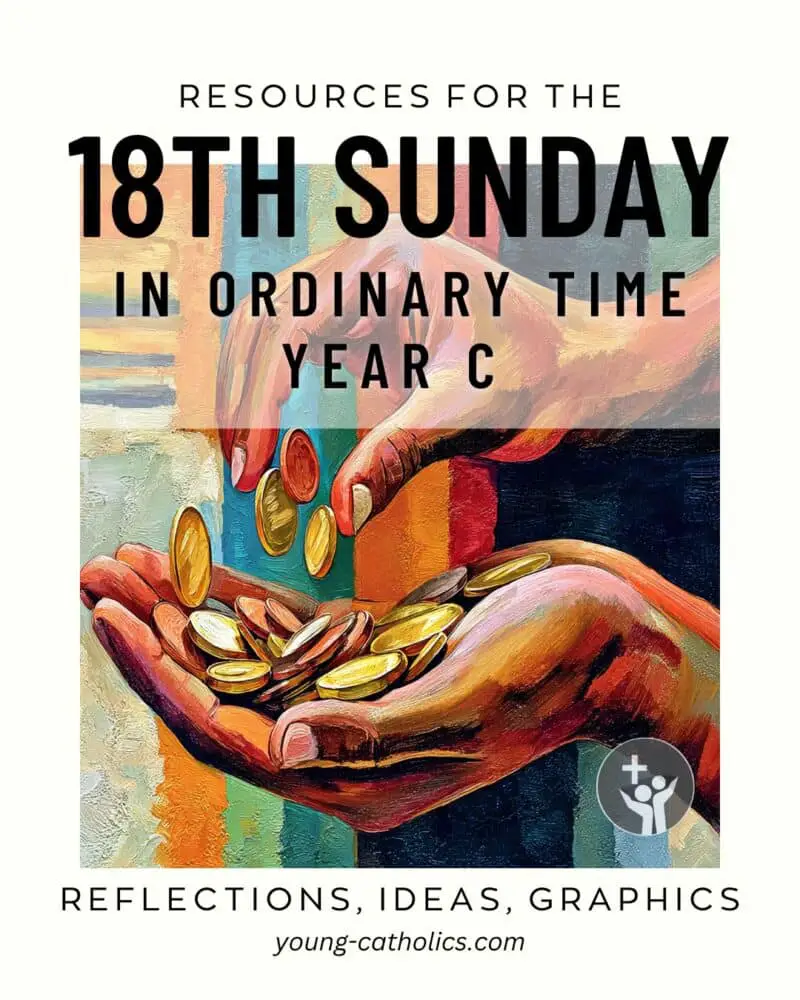
18th Sunday in Ordinary Time Year C
What Really Matters
In Luke 12:13-21, someone asks Jesus to settle a problem about money. Jesus warns the crowd not to focus too much on riches. He tells a story about a rich man who stores up goods for himself but dies before he can enjoy them.
The man thought he was secure, but he forgot about God. Jesus explains that life is not about building wealth. It’s more important to grow rich in the things that matter to God, like love, faith, and care for others.
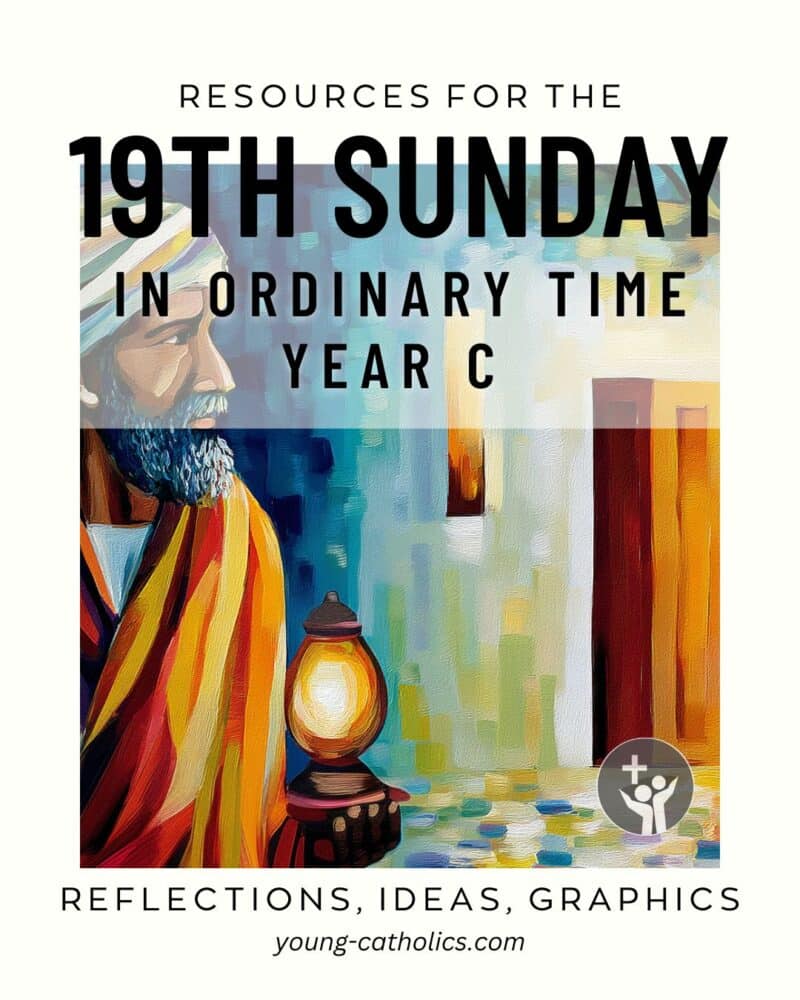
19th Sunday in Ordinary Time Year C
Be Ready and Faithful
In Luke 12:32-48, Jesus tells His followers not to be afraid. He reminds them that real treasure is not on earth but in heaven. He tells them to be ready, like servants waiting for their master to return home.
Jesus says that those who are ready and faithful will be blessed. He warns that much is expected from those who have been given much. His message is clear: live each day with trust in God and be responsible with what you’ve been given.
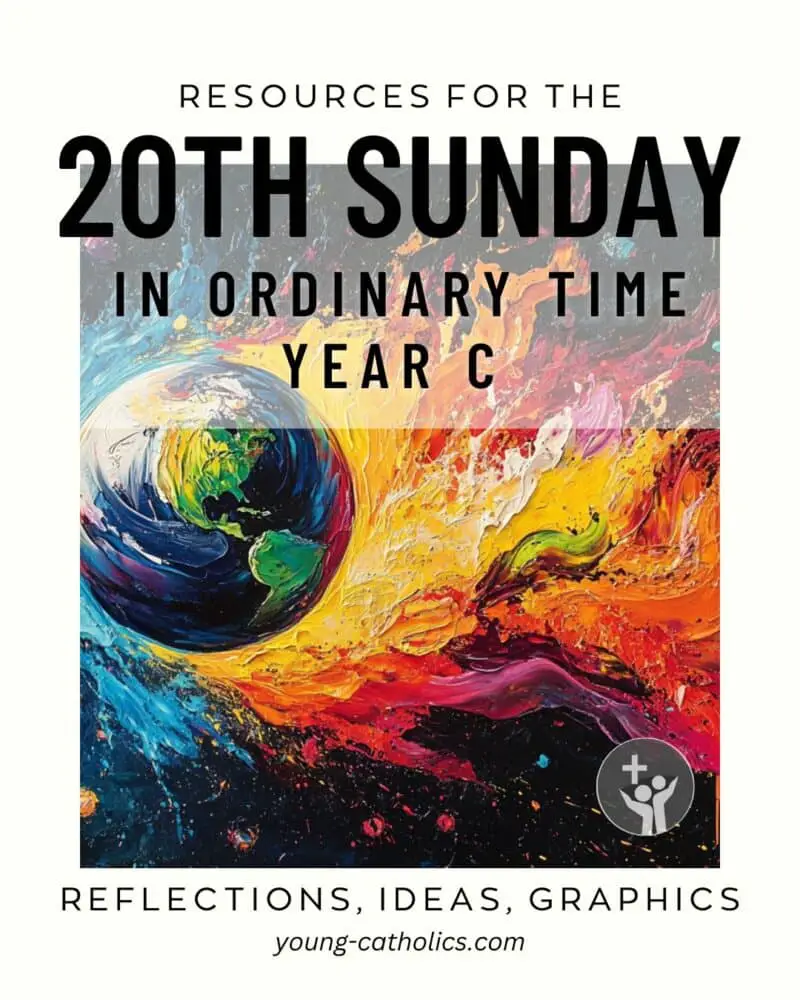
20th Sunday in Ordinary Time Year C
Choosing What Is Right
In Luke 12:49-53, Jesus tells His followers that His message will not always bring peace. Sometimes, it will cause division, even within families. People will have to make a choice about following Him.
Jesus explains that His mission will bring change. Not everyone will agree with it. This reading reminds us that living by His teachings may be hard. But we are called to stay faithful, even when others do not understand.

3rd Sunday of Lent Year C
Time to Turn Back to God
In Luke 13:1-9, people tell Jesus about a tragedy, and He uses it as a chance to teach. He says that when bad things happen, it doesn’t mean the people were worse sinners. But He warns everyone to turn away from sin while there is still time.
Jesus then tells a parable about a fig tree that isn’t growing fruit. The owner wants to cut it down, but the gardener asks for one more year to care for it. This story shows that God is patient, but we are called to change and grow before time runs out.
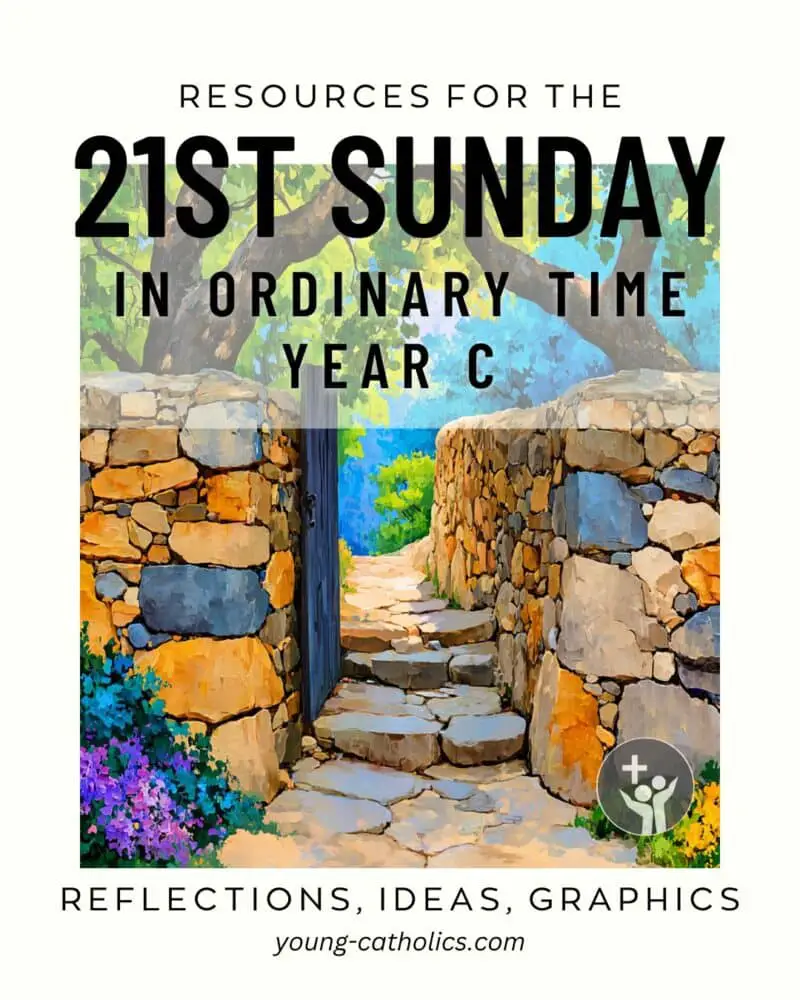
21st Sunday in Ordinary Time Year C
The Narrow Door
In Luke 13:22-30, someone asks Jesus if only a few people will be saved. Jesus answers by saying to try hard to enter through the narrow door. He warns that many will try but will be too late.
He says that people will come from all parts of the world and take their place at the feast in God’s kingdom. Some who seem important now will be last, and some who seem small will be first. Jesus teaches that it’s not enough to know about Him—we must live His way each day.
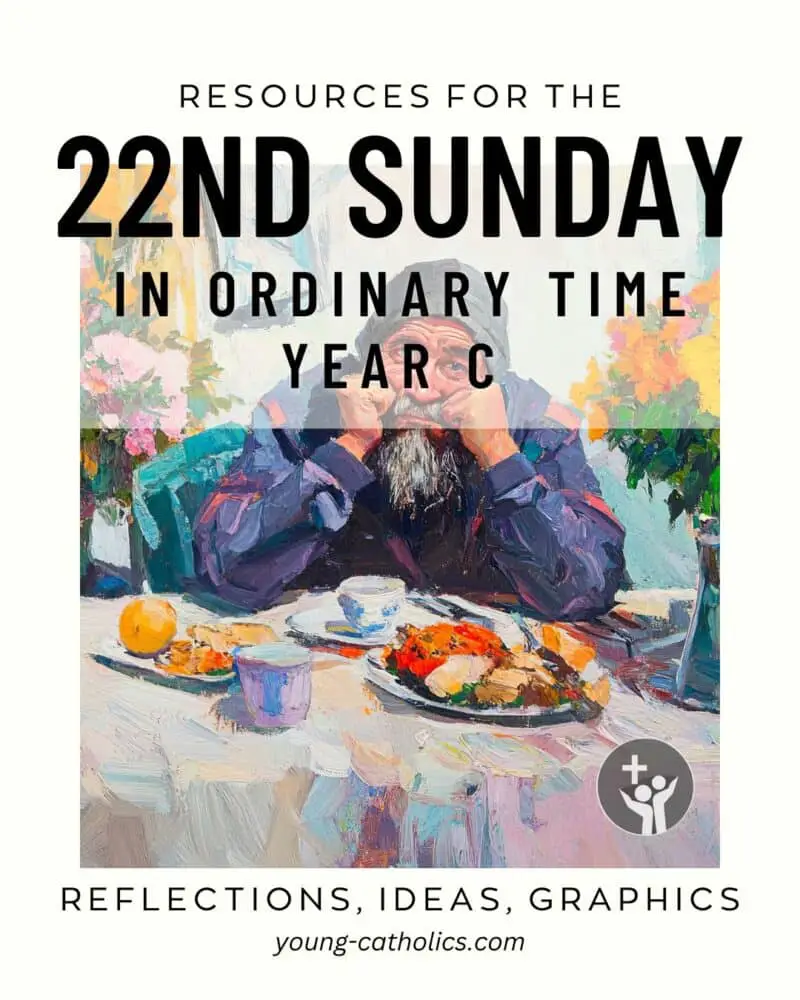
22nd Sunday in Ordinary Time Year C
Be Humble and Invite Everyone
In Luke 14:1, 7-14, Jesus is invited to eat at the home of a Pharisee. He watches how the guests choose the best seats. Then He tells them not to seek the highest place but to sit in a lower one. Those who make themselves important will be brought down, and those who are humble will be lifted up.
Jesus also tells the host not to invite only friends and rich neighbors. Instead, invite the poor, the sick, and those who cannot repay you. God will reward kindness done without expecting anything in return. This teaches us to live with humility and generosity.
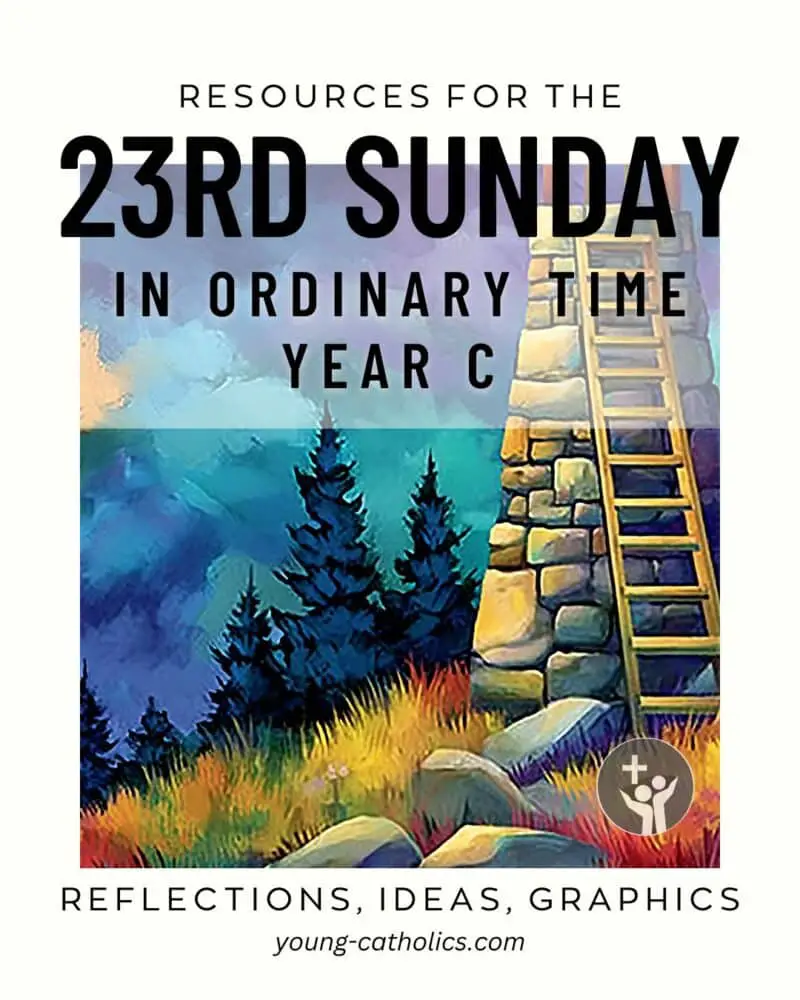
23rd Sunday in Ordinary Time Year C
Count the Cost
In Luke 14:25-33, large crowds are following Jesus. He tells them that being His disciple means putting Him first, even before family or comfort. He says they must carry their cross and be ready to make sacrifices.
Jesus gives two examples—a man building a tower and a king going to war. Both must plan ahead. In the same way, Jesus asks people to think carefully before choosing to follow Him. Discipleship takes commitment, not just good intentions.

4th Sunday of Lent Year C
The Lost Son Comes Home
In Luke 15:1-3, 11-32, Jesus tells a story about a younger son who asks for his inheritance, leaves home, and wastes everything. When the prodigal son has nothing left, he decides to return and ask his father for forgiveness. The father welcomes him with joy and prepares a feast.
The older son is upset. He stayed home and worked hard, yet no celebration was ever held for him. The father explains that it is right to celebrate, because the lost son has come back. This story shows how God is ready to forgive and how we are called to share in that joy.

24th Sunday in Ordinary Time Year C
God Welcomes the Lost
In Luke 15:1-32, Jesus tells three stories to show how God welcomes those who have gone astray. First, a shepherd leaves ninety-nine sheep to find one that is lost. Then, a woman searches her house for a lost coin and celebrates when she finds it.
The last story is about a son who leaves home and wastes all he has. When he returns, his father welcomes him back with joy. The older brother is angry, but the father says it is right to celebrate. These stories remind us that God always wants to bring people back and that we should be glad when someone returns to Him.

The Most Sacred Heart of Jesus Year C
One Lost Sheep Matters
In Luke 15:3-7, Jesus tells a short story about a shepherd who has one hundred sheep. When one goes missing, he leaves the ninety-nine to look for the one that is lost. When he finds it, he is full of joy and carries it home.
Then the shepherd calls his friends and neighbors to celebrate. Jesus says that in the same way, there is great joy in heaven when one sinner turns back to God. This reading shows how much God cares for each person, no matter how far they have wandered.
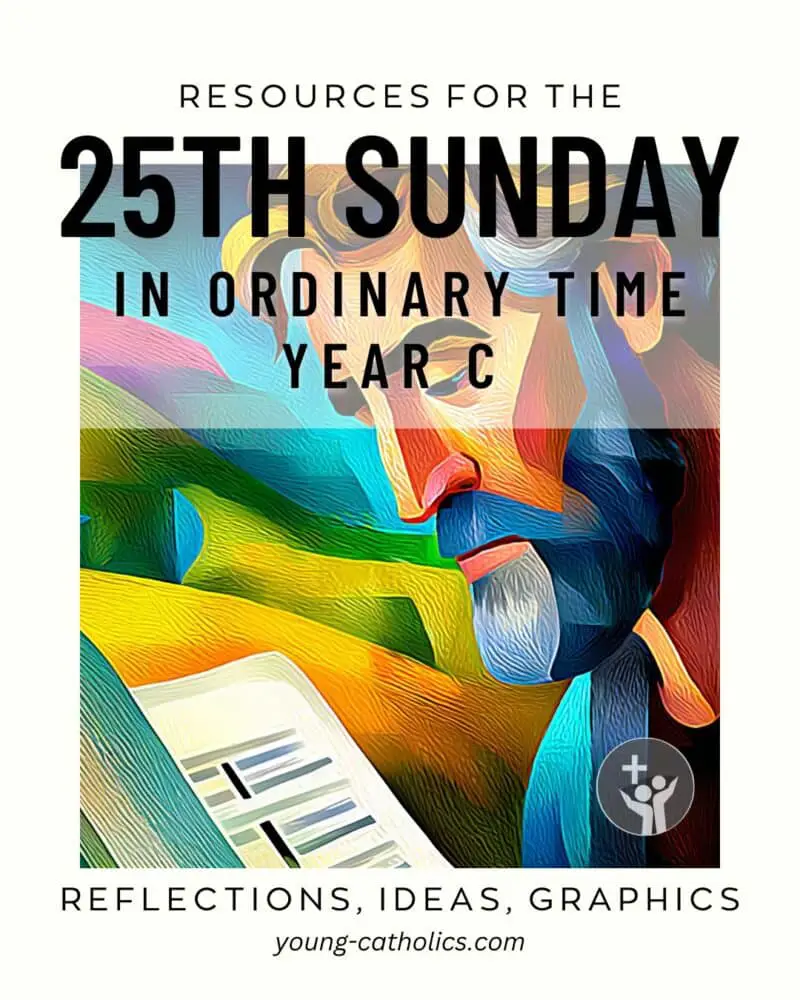
25th Sunday in Ordinary Time Year C
Be Wise with What You Have
In Luke 16:1-13, Jesus tells a story about a manager who is about to lose his job. Before he leaves, he makes deals with people who owe his boss money. He lowers their debts so they will treat him kindly later.
Jesus says the manager acted with clever thinking. He teaches that we should also be wise with what we have. He reminds us that if we cannot be trusted with small things, we cannot be trusted with more. Jesus also says we cannot serve both God and money. We must choose what matters most.
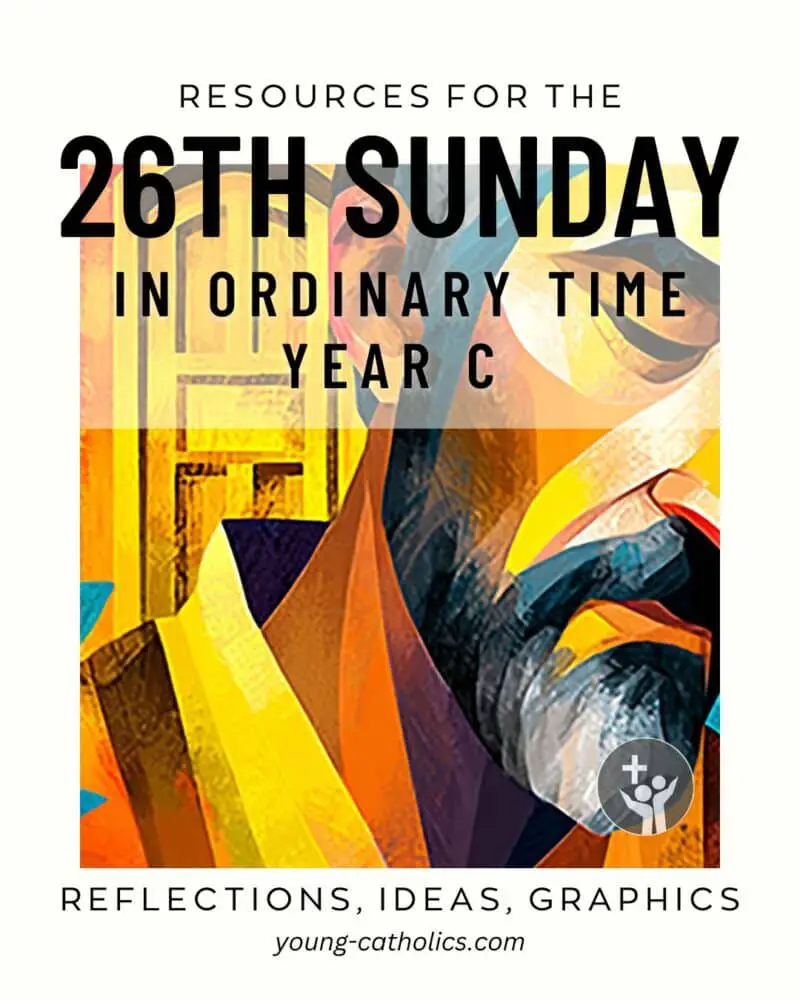
26th Sunday in Ordinary Time Year C
The Rich Man and the Poor Man
In Luke 16:19-31, Jesus tells a story about a rich man who lives in comfort and a poor man named Lazarus who suffers outside his gate. The rich man ignores Lazarus. When they both die, Lazarus is taken to a place of peace, and the rich man ends up in great pain.
The rich man asks for help but is told it is too late. He also wants to warn his family, but he is told they already have the teachings of Moses and the prophets. This story reminds us to care for others now and listen to God’s word while we have the chance.
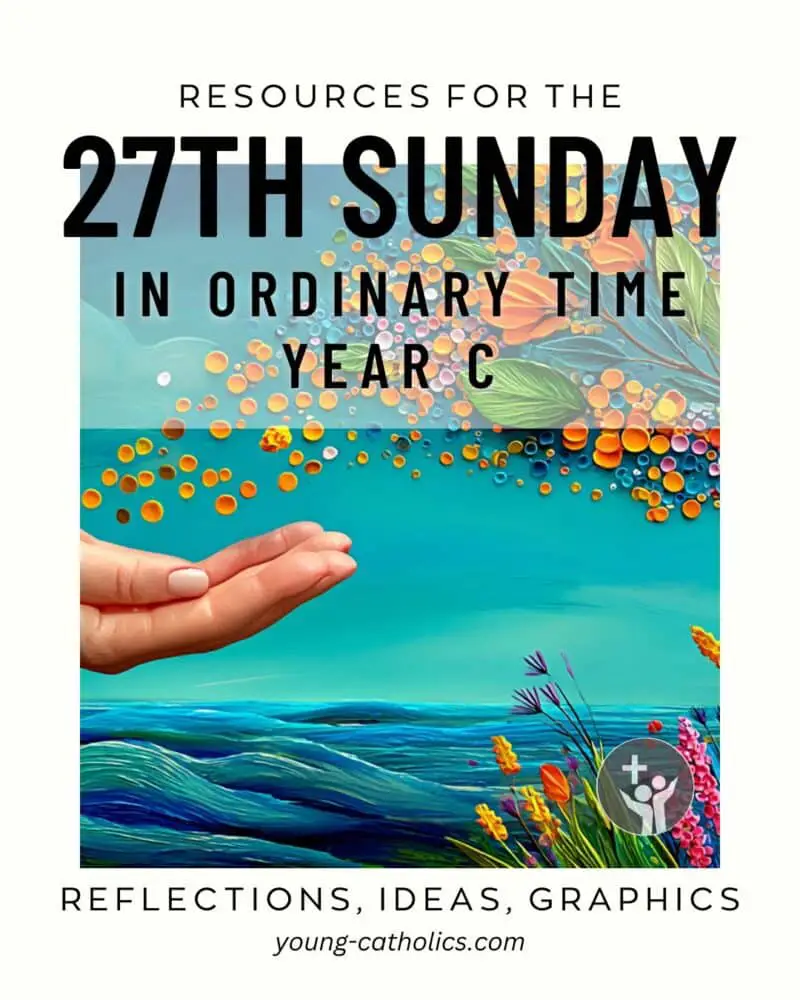
27th Sunday in Ordinary Time Year C
Faith and Duty
In Luke 17:5-10, the apostles ask Jesus to increase their faith. He tells them that even a small amount of faith can do great things. Faith is not about size but about trusting God fully.
Jesus then gives an example of a servant. After working all day, the servant does not expect special thanks for doing his job. In the same way, Jesus says His followers should serve with humility. Doing what God asks is our duty, not something done for reward or praise.
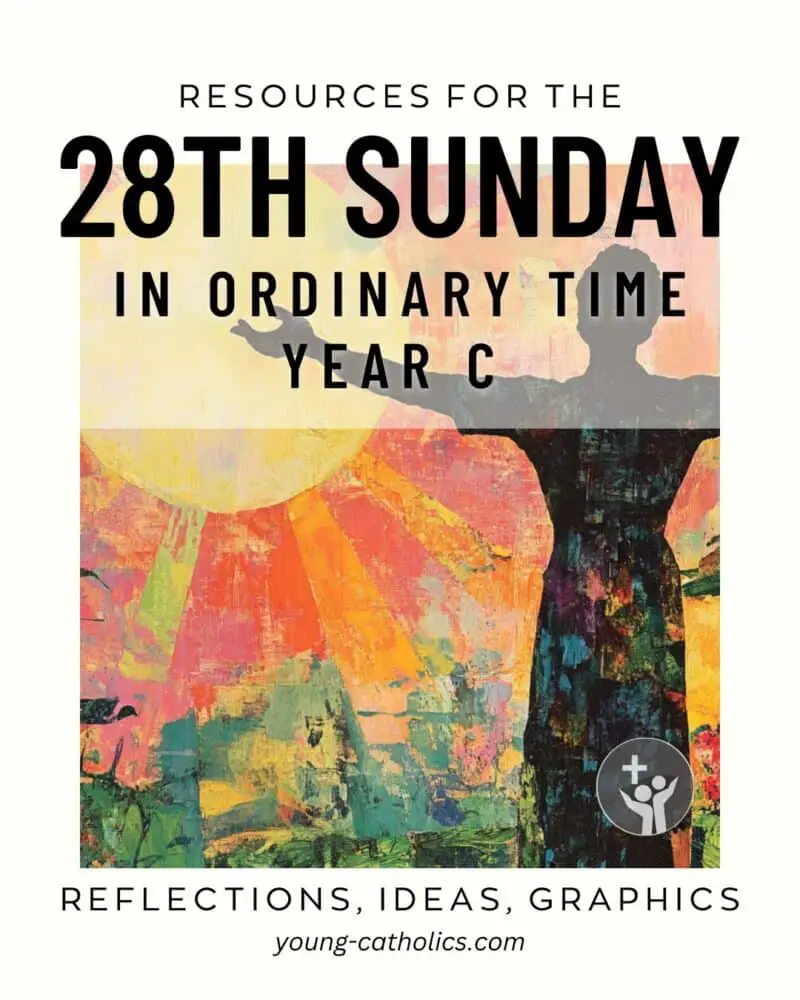
28th Sunday in Ordinary Time Year C
One Came Back to Say Thanks
In Luke 17:11-19, Jesus meets ten men with leprosy. They ask Him for help. He tells them to go show themselves to the priests. As they go, they are healed along the way.
Only one of them, a Samaritan, returns to thank Jesus. Jesus wonders why the others did not come back. He tells the man that his faith has saved him. This story reminds us to be thankful and to see God’s work in our lives, even when others may forget.
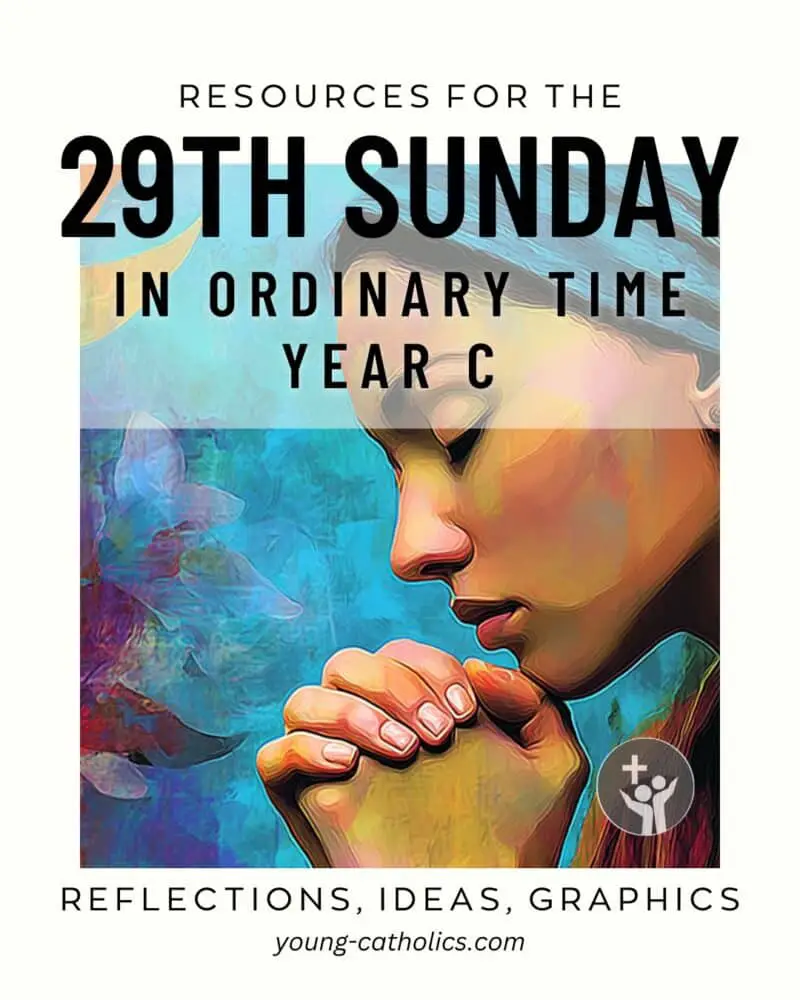
29th Sunday in Ordinary Time Year C
Never Give Up on Prayer
In Luke 18:1-8, Jesus tells a story about a widow who keeps asking a judge for help. At first, the judge does not care, but he gives in because she keeps coming back. He wants peace and knows she won’t stop asking.
Jesus says if an unfair judge can give justice, then we should trust that God will listen. God cares and will respond, even if the answer takes time. This story reminds us to pray always and not lose hope, even when things are hard.
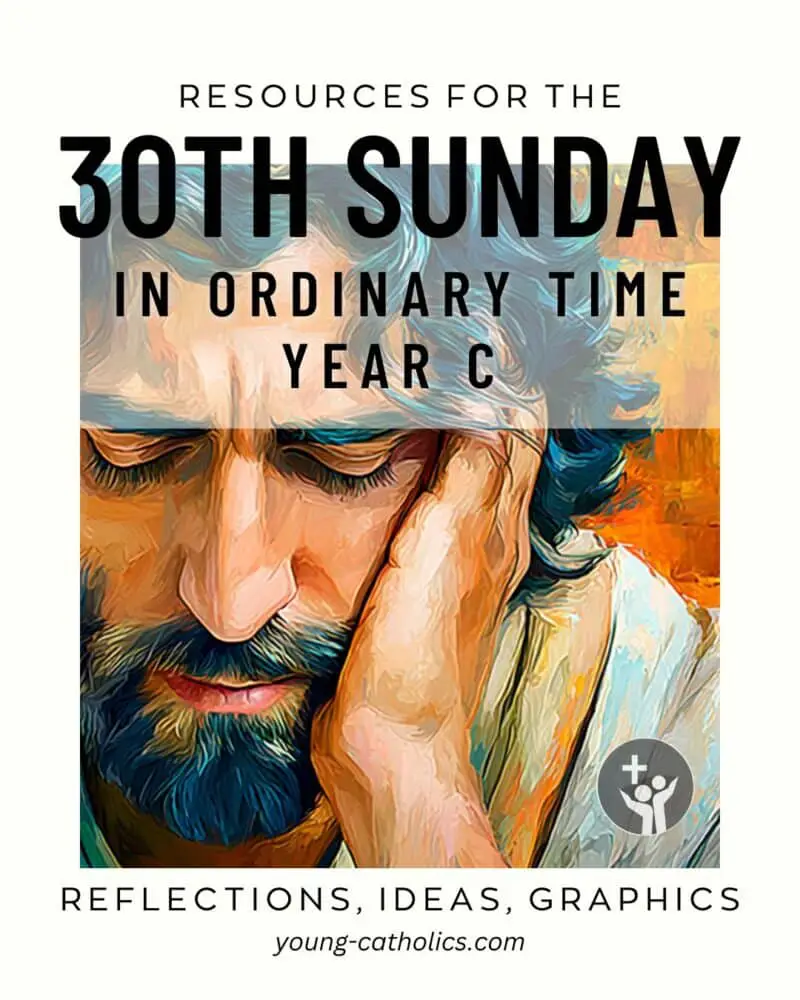
30th Sunday in Ordinary Time Year C
Two Prayers, One Lesson
In Luke 18:9-14, Jesus tells a story about two men who go to the temple to pray. One is a Pharisee who talks about all the good things he does. He looks down on others and thanks God that he is not like them.
The other is a tax collector who stands far off and asks God for mercy. Jesus says it is the second man who goes home right with God. This story teaches that God listens to those who are humble, not those who try to make themselves look better than others.

31st Sunday in Ordinary Time Year C
A Change of Heart
In Luke 19:1-10, Jesus passes through Jericho and sees a man named Zacchaeus. He is a rich tax collector, not liked by the people. Zacchaeus wants to see Jesus, so he climbs a tree. Jesus notices him and says He will stay at his house.
The people are surprised, but Zacchaeus is happy. He promises to give to the poor and pay back anyone he has cheated. Jesus says that salvation has come to his house. This story shows that no one is too far from God to change and start fresh.

Palm Sunday of the Lord’s Passion Year C (Procession)
Jesus Enters Jerusalem
In Luke 19:28-40, Jesus approaches Jerusalem and tells two disciples to find a colt that has never been ridden. They bring it to Him, and He rides it into the city. People spread their cloaks on the road and praise God with joyful voices.
The crowd shouts blessings, calling Jesus their King. Some Pharisees tell Him to quiet the crowd, but Jesus says that if the people were silent, the stones would cry out. This moment shows that Jesus is welcomed as a king, but not everyone understands the kind of king He truly is.

32nd Sunday in Ordinary Time Year C
Life After Death
In Luke 20:27-38, some Sadducees, who do not believe in resurrection, try to trap Jesus with a question about marriage after death. They ask about a woman who married seven brothers, one after another, all of whom died. They want to know whose wife she will be in the next life.
Jesus explains that life after death is not the same as life now. People will not marry in the same way. He says that God is the God of the living, not the dead, and that those who belong to Him will live. This reminds us that God’s promises go beyond this world.

33rd Sunday in Ordinary Time Year C
Stay Strong in Hard Times
In Luke 21:5-19, people admire the temple, but Jesus says it will one day be destroyed. He warns that there will be wars, earthquakes, and other troubles. Many will be afraid, and some will try to mislead others by claiming to speak in His name.
Jesus tells His followers not to panic. He says they will face rejection and even persecution. But He promises to give them the words they need. He tells them to stay faithful and not give up. In the end, those who stay strong will be saved.

1st Sunday of Advent Year C
Be Ready and Watchful
In Luke 21:25-28, 34-36, Jesus speaks about signs that will appear in the sky and on earth. People will be afraid, and many things will seem to fall apart. But Jesus says that when these things begin to happen, His followers should stand tall. Their time of hope is near.
He warns people not to get distracted by worries or by chasing pleasure. He says to stay awake and pray always. That way, they will be ready to stand strong when He returns. This reading reminds us to live each day with faith and attention.

Palm Sunday of the Lord’s Passion Year C
The Road to the Cross
In Luke 22:1–23:56, the story of Jesus’ suffering and death unfolds. It begins with the Last Supper. Jesus shares bread and wine with His disciples and tells them that one of them will betray Him. He also teaches them to serve one another, even as He prepares for His own suffering.
After praying in the garden, Jesus is arrested and taken away. Peter denies Him three times. Jesus is brought before leaders who mock and beat Him. Though Pilate finds no guilt, the crowd demands crucifixion. Jesus carries His cross, speaks words of mercy, and dies between two criminals.
One criminal asks Jesus to remember him, and Jesus offers him hope. After Jesus dies, a Roman centurion praises God, and His followers quietly watch. Jesus is buried in a tomb by Joseph of Arimathea. This long passage shows Jesus staying faithful through pain and offering mercy until the end.

Solemnity of Christ the King Year C
A Promise from the Cross
In Luke 23:35-43, Jesus is on the cross while people watch and mock Him. Some leaders and soldiers tell Him to save Himself if He is really the chosen one. One of the criminals next to Him also joins in the insults.
But the other criminal defends Jesus. He admits his own guilt and asks Jesus to remember him. Jesus answers with a promise that the man will be with Him in paradise. This moment shows that even in His last hours, Jesus offers mercy to those who turn to Him.
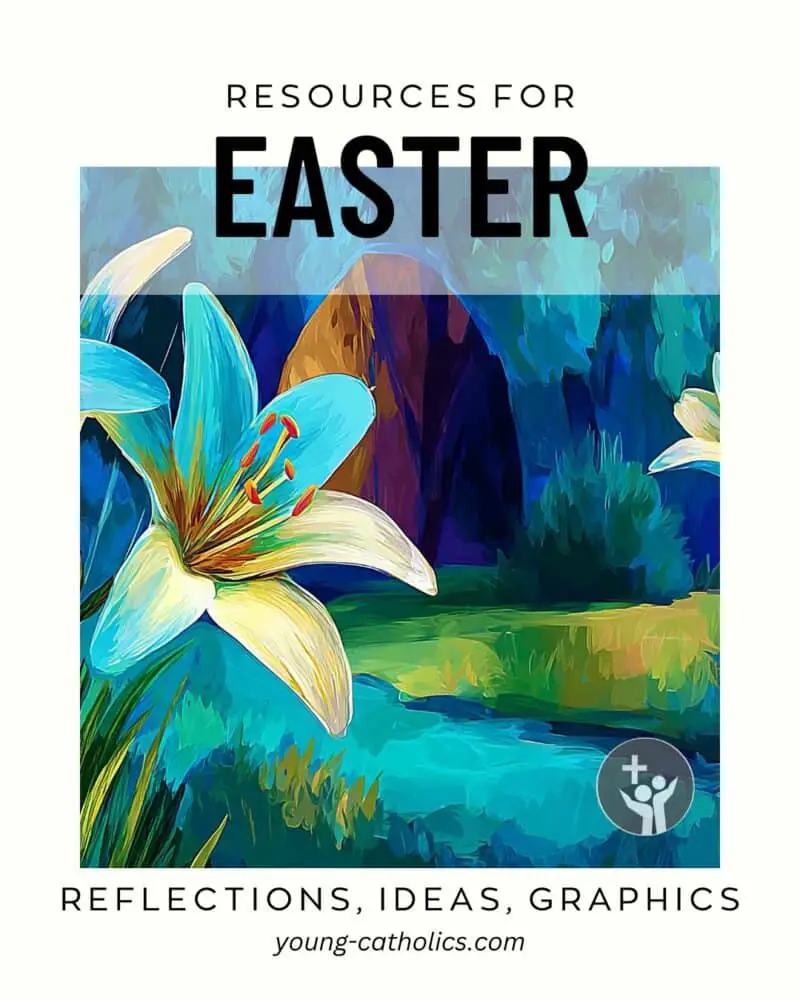
Easter Vigil
He Is Not Here
In Luke 24:1-12, some women go to Jesus’ tomb early in the morning. They bring spices to prepare His body. But when they arrive, the stone is rolled away, and the tomb is empty. Two men in shining clothes appear and tell them that Jesus has risen.
The women run to tell the apostles, but the men do not believe them at first. Peter runs to the tomb and sees the burial cloths but no body. He leaves amazed at what happened. This reading shows the first moments of joy and surprise on Easter morning.
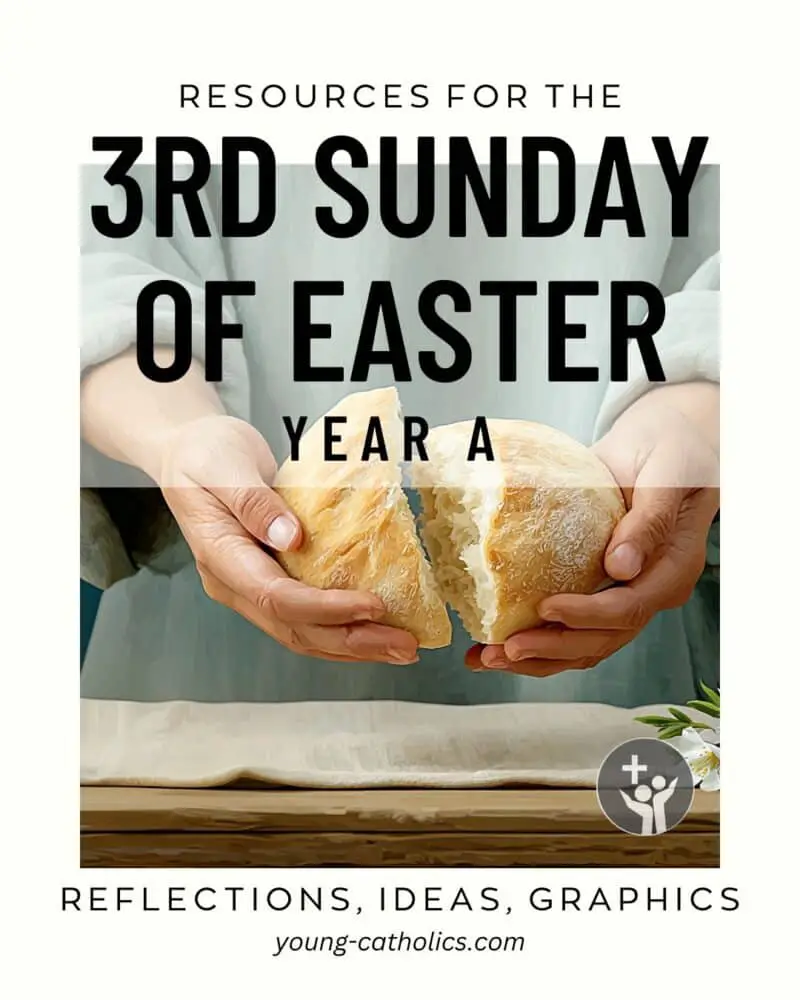
3rd Sunday of Easter Year A
Jesus Walks Beside Them
In Luke 24:13-35, two disciples walk to a village called Emmaus. They talk about Jesus’ death and feel sad. A stranger joins them and asks what they are discussing. They do not know it is Jesus. He explains the Scriptures to them as they walk.
When they reach the village, they invite Him to stay. At the table, He breaks bread, and they recognize Him. Then He disappears. The disciples hurry back to tell the others. This reading shows how Jesus is with us, even when we do not see Him right away.

3rd Sunday of Easter Year B
Peace and Understanding
In Luke 24:35-48, the disciples are talking about Jesus appearing on the road to Emmaus. While they are gathered, Jesus suddenly stands among them. At first, they are frightened and think He is a ghost.
Jesus shows them His hands and feet and eats in front of them to prove He is real. Then He helps them understand the Scriptures. He explains that the Messiah had to suffer, die, and rise. He tells them they will be witnesses of these things, sharing the message of forgiveness with all nations.
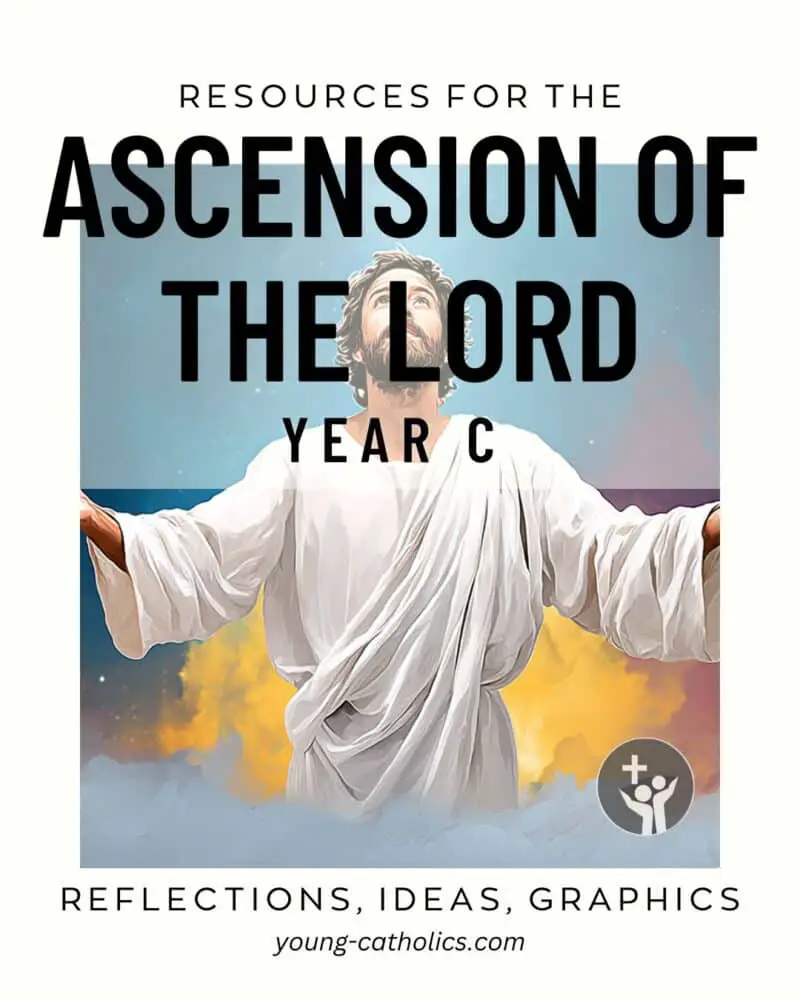
Ascension of the Lord Year C
Jesus Returns to Heaven
In Luke 24:46-53, Jesus tells His disciples that the Scriptures said the Messiah would suffer, rise on the third day, and that people would be called to turn back to God. He says they are witnesses of all these things.
Jesus leads them out of the city, lifts His hands, and blesses them. Then He is taken up into heaven. The disciples return to Jerusalem full of joy. They stay at the temple, praising God. This moment marks the end of Jesus’ time on earth and the beginning of the Church’s mission.
At Weekday Masses
- Nativity of Saint John the Baptist (Vigil Mass) – Luke 1:5-17: The Angel’s Message to Zechariah
- Advent Weekday on December 19 – Luke 1:5-25: John the Baptist’s Conception
- Advent Weekday on December 20 – Luke 1:26-38: The Annunciation, Mary’s Divine Calling
- Our Lady of Guadalupe – Luke 1:26-38: Gabriel Visits Mary
- The Annunciation – Luke 1:26-38: Annunciation to Mary
- The Immaculate Conception of the Blessed Virgin Mary – Luke 1:26-38:
- Advent Weekday on December 21 – Mary’s Divine Calling
- Our Lady of Guadalupe – Luke 1:39-47: Mary Visits Elizabeth
- The Visitation of the Blessed Virgin Mary – Luke 1:39-56: Mary’s Visit and Her Song of Praise
- Saturday of the 12th Week in Ordinary Time I – Luke 1:46-47, 48-49, 50 and 53, 54-55: Mary’s Song of Praise
- Advent Weekday on December 22 – Luke 1:46-56: Mary’s Magnificat
- Advent Weekday on December 23 – Luke 1:57-66: John’s Birth and Naming
- Nativity of Saint John the Baptist (Mass During the Day) – Luke 1:57-66, 80: The Birth and Naming of John
- Advent Weekday on December 24 – Luke 1:67-79: Zechariah’s Prophecy
- Saturday of the 3rd Week in Ordinary Time I – Luke 1:69-70, 71-72, 73-75, 68: God’s Salvation Fulfilled
- Monday of the 29th Week in Ordinary Time I – Luke 1:69-70, 71-72, 73-75, 68: God Fulfills His Promise
- Thursday of the 27th Week in Ordinary Time II – Luke 1:69-70, 71-72, 73-75: God Has Come to Help Us
- Most Holy Name of Jesus – Luke 2:21-24: Jesus Is Circumcised and Presented in the Temple
- 5th Day in the Octave of Christmas – Luke 2:22-35: Simeon’s Prophecy
- Our Lady of Sorrows – Luke 2:33-35: Simeon’s Prophecy to Mary
- 6th Day in the Octave of Christmas – Luke 2:36-40: Anna’s Witness
- The Immaculate Heart of Mary – Luke 2:41-51: The Boy Jesus in the Temple
- Saint Joseph, Husband of Mary – Luke 2:41-51a: Jesus at the Temple
- Christmas Weekday on January 6 – Luke 3:23-38: Jesus’ Genealogy
- Thursday after Epiphany – Luke 4:14-22: Jesus Proclaims the Fulfillment of Isaiah’s Prophecy
- Monday of the 22nd Week in Ordinary Time Cycle 1 or Cycle 2 – Luke 4:16-30: Jesus Rejected at Nazareth
- Monday of the 3rd Week of Lent – Luke 4:24-30: Rejected at Nazareth
- Tuesday of the 22nd Week in Ordinary Time Cycle 1 or Cycle 2 – Luke 4:31-37: Jesus Casts Out an Unclean Spirit
- Wednesday of the 22nd Week in Ordinary Time Cycle 1 or Cycle 2 – Luke 4:38-44:
- Thursday of the 22nd Week in Ordinary Time Cycle 1 or Cycle 2 – Jesus Heals Many
- Friday after Epiphany – Luke 5:12-16: The Healing of the Leper
- Monday of the 2nd Week of Advent – Luke 5:17-26: Healing and Forgiveness
- Saturday after Ash Wednesday – Luke 5:27-32: Levi’s Call and Response
- Friday of the 22nd Week in Ordinary Time Cycle 1 or Cycle 2 – Luke 5:33-39: New and Old Cannot Be Mixed
- Saturday of the 22nd Week in Ordinary Time Cycle 1 or Cycle 2 – Luke 6:1-5: The Lord of the Sabbath
- Monday of the 23rd Week in Ordinary Time Cycle 1 or Cycle 2 – Luke 6:6-11: Healing on the Sabbath
- Tuesday of the 23rd Week In Ordinary Time Cycle 1 or Cycle 2 – Luke 6:12-19: Jesus Chooses the Twelve
- St. Simon and St. Jude, Apostles – Luke 6:12-16: Jesus Chooses the Twelve
- Wednesday of the 23rd Week in Ordinary Time Cycle 1 or Cycle 2 – Luke 6:20-26: Blessings and Warnings
- Thursday of the 23rd Week in Ordinary Time Cycle 1 or Cycle 2 – Luke 6:27-38: Love Your Enemies and Be Merciful
- Monday of the 2nd Week of Lent – Luke 6:36-38: Mercy and Generosity Taught
- Friday of the 23rd Week in Ordinary Time Cycle 1 or Cycle 2 – Luke 6:39-42: Correct Yourself First
- Saturday of the 23rd Week in Ordinary Time Cycle 1 or Cycle 2 – Luke 6:43-49: The Fruit of a Good Heart
- Monday of the 24th Week in Ordinary Time Cycle 1 or Cycle 2 – Luke 7:1-10: The Centurion’s Humble Faith
- Tuesday of the 24th Week in Ordinary Time Cycle 1 or Cycle 2 – Luke 7:11-17: Jesus Raises a Widow’s Son
- Wednesday of the 3rd Week of Advent – Luke 7:18B-23: Jesus Heals and Reveals His Power
- Thursday of the 3rd Week of Advent – Luke 7:24-30: Jesus Speaks About John the Baptist
- Wednesday of the 24th Week in Ordinary Time Cycle 1 or Cycle 2 – Luke 7:31-35: The People of This Generation
- Thursday of the 24th Week in Ordinary Time Cycle 1 or Cycle 2 – Luke 7:36-50: Forgiveness and Love
- Friday of the 24th Week in Ordinary Time Cycle 1 or Cycle 2 – Luke 8:1-3: Jesus and His Followers
- Saturday of the 24th Week in Ordinary Time Cycle 1 or Cycle 2 – Luke 8:4-15: The Parable of the Sower
- Monday of the 25th Week in Ordinary Time Cycle 1 or Cycle 2 – Luke 8:16-18: Let Your Light Shine for All to See
- Tuesday of the 25th Week in Ordinary Time Cycle 1 or Cycle 2 – Luke 8:19-21: Jesus Defines His True Family
- Wednesday of the 25th Week in Ordinary Time Cycle 1 or Cycle 2 – Luke 9:1-6: Jesus Sends His Disciples to Preach and Heal
- Thursday of the 25th Week in Ordinary Time Cycle 1 or Cycle 2 – Luke 9:7-9: Herod’s Curiosity About Jesus
- Friday of the 25th Week in Ordinary Time Cycle 1 or Cycle 2 – Luke 9:18-22: Peter’s Confession and Jesus’ Prediction
- Thursday after Ash Wednesday – Luke 9:22-25: The Cost of Discipleship
- The Transfiguration of the Lord – Luke 9:28b-36 : The Transfiguration of Jesus
- Saturday of the 25th Week in Ordinary Time Cycle 1 or Cycle 2 – Luke 9:43b-45: Jesus Foretells His Betrayal
- Monday of the 26th Week in Ordinary Time Cycle 1 or Cycle 2 – Luke 9:46-50: True Greatness in Humility
- Tuesday of the 26th Week in Ordinary Time Cycle 1 or Cycle 2 – Luke 9:51-56: Rejected on the Way to Jerusalem
- Wednesday of the 26th Week in Ordinary Time Cycle 1 or Cycle 2 – Luke 9:57-62: The Cost of Following Jesus
- Saint Luke, Evangelist – Luke 10:1-9: Jesus Sends Out the Seventy-Two
- Thursday of the 26th Week in Ordinary Time Cycle 1 or Cycle 2 – Luke 10:1-12: The Sending of the Seventy-Two
- Friday of the 26th Week in Ordinary Time Cycle 1 or Cycle 2 – Luke 10:13-16: A Warning to Unrepentant Cities
- Saturday of the 26th Week in Ordinary Time Cycle 1 or Cycle 2 – Luke 10:17-24: Rejoice in Heaven’s Gift
- Tuesday of the 1st Week of Advent – Luke 10:21-24: Hidden and Revealed
- Monday of the 27th Week in Ordinary Time Cycle 1 or Cycle 2 – Luke 10:25-37: The Parable of the Good Samaritan
- Tuesday of the 27th Week in Ordinary Time Cycle 1 or Cycle 2 – Luke 10:38-42: Martha and Mary Welcome Jesus
- Saints Martha, Mary, and Lazarus – Luke 10:38-42: Martha and Mary
- Wednesday of the 27th Week in Ordinary Time Cycle 1 or Cycle 2 – Luke 11:1-4: The Lord’s Prayer
- Thursday of the 27th Week in Ordinary Time Cycle 1 or Cycle 2 – Luke 11:5-13: Persistent Prayer and Trust in God
- Thursday of the 3rd Week of Lent – Luke 11:14-23: Authority Over Demons
- Friday of the 27th Week in Ordinary Time Cycle 1 or Cycle 2 – Luke 11:15-26: Jesus Defends His Power
- Saturday of the 27th Week in Ordinary Time Cycle 1 or Cycle 2 – Luke 11:27-28: True Blessing Comes from Obeying God
- Wednesday of the 1st Week of Lent – Luke 11:29-32: Sign of Jonah
- Monday of the 28th Week in Ordinary Time Cycle 1 or Cycle 2 – Luke 11:29-32: A Call to Repentance
- Tuesday of the 28th Week in Ordinary Time Cycle 1 or Cycle 2 – Luke 11:37-41: True Cleanliness Comes from Within
- Wednesday of the 28th Week in Ordinary Time Cycle 1 or Cycle 2 – Luke 11:42-46: Warnings to the Pharisees and Scholars
- Thursday of the 28th Week in Ordinary Time Cycle 1 or Cycle 2 – Luke 11:47-54: Warnings to the Pharisees and Scholars
- Friday of the 28th Week in Ordinary Time Cycle 1 or Cycle 2 – Luke 12:1-7: Truth and Trust in God
- Saturday of the 28th Week in Ordinary Time Cycle 1 or Cycle 2 – Luke 12:8-12: Acknowledging Christ and the Spirit’s Guidance
- Monday of the 29th Week in Ordinary Time Cycle 1 or Cycle 2 – Luke 12:13-21: Wealth That Matters to God
- Tuesday of the 29th Week in Ordinary Time Cycle 1 or Cycle 2 – Luke 12:35-38: Blessed are the Watchful Servants
- Wednesday of the 29th Week in Ordinary Time Cycle 1 or Cycle 2 – Luke 12:39-48: Be Prepared for the Master’s Return
- Thursday of the 29th Week in Ordinary Time Cycle 1 or Cycle 2 – Luke 12:49-53: Fire and Division
- Friday of the 29th Week in Ordinary Time Cycle 1 or Cycle 2 – Luke 12:54-59: Understanding the Signs
- Saturday of the 29th Week in Ordinary Time Cycle 1 or Cycle 2 – Luke 13:1-9: The Call to Repentance
- Monday of the 30th Week in Ordinary Time Cycle 1 or Cycle 2 – Luke 13:10-17: Healing on the Sabbath
- Tuesday of the 30th Week in Ordinary Time Cycle 1 or Cycle 2 – Luke 13:18-21: The Kingdom’s Growth
- Wednesday of the 30th Week in Ordinary Time Cycle 1 or Cycle 2 – Luke 13:22-30: The Narrow Door to Salvation
- Thursday of the 30th Week in Ordinary Time Cycle 1 or Cycle 2 – Luke 13:31-35: Jesus Mourns for Jerusalem
- Friday of the 30th Week in Ordinary Time Cycle 1 or Cycle 2 – Luke 14:1-6: Jesus Heals Despite Sabbath Customs
- Saturday of the 30th Week in Ordinary Time Cycle 1 or Cycle 2 – Luke 14:1, 7-11: Humility at the Banquet
- Monday of the 31st Week in Ordinary Time Cycle 1 or Cycle 2 – Luke 14:12-14: Invite the Poor to Your Feast
- Tuesday of the 31st Week in Ordinary Time Cycle 1 or Cycle 2 – Luke 14:15-24: The Parable of the Banquet
- Wednesday of the 31st Week in Ordinary Time Cycle 1 or Cycle 2 – Luke 14:25-33: The Cost of Following Jesus
- Thursday of the 31st Week in Ordinary Time Cycle 1 or Cycle 2 – Luke 15:1-10: The Joy of Finding the Lost
- Saturday of the 2nd Week of Lent – Luke 15:1-3, 11-32: The Parable of the Forgiving Father
- Friday of the 31st Week in Ordinary Time Cycle 1 or Cycle 2 – Luke 16:1-8: The Resourceful Manager
- Thursday of the 2nd Week of Lent – Luke 16:19-31: Lesson of Lazarus and the Rich Man
- Saturday of the 31st Week in Ordinary Time Cycle 1 or Cycle 2 – Luke 16:9-15: True and Lasting Wealth
- Monday of the 32nd Week in Ordinary Time Cycle 1 or Cycle 2 – Luke 17:1-6: Faith, Forgiveness, and Caution
- Tuesday of the 32nd Week in Ordinary Time Cycle 1 or Cycle 2 – Luke 17:7-10: Humble Service
- Wednesday of the 32nd Week in Ordinary Time Cycle 1 or Cycle 2 – Luke 17:11-19: The Healing of the Ten and the Grateful Samaritan
- Thursday of the 32nd Week in Ordinary Time Cycle 1 or Cycle 2 – Luke 17:20-25: Signs of the Kingdom and the Day of the Son of Man
- Friday of the 32nd Week in Ordinary Time Cycle 1 or Cycle 2 – Luke 17:26-37: Be Ready for the Day of the Son of Man
- Saturday of the 32nd Week in Ordinary Time Cycle 1 or Cycle 2 – Luke 18:1-8: The Parable of the Widow’s Persistence
- Saturday of the 3rd Week of Lent – Luke 18:9-14: Prayer of Humility
- Monday of the 33rd Week in Ordinary Time Cycle 1 or Cycle 2 – Luke 18:35-43: The Healing of the Blind Beggar
- Tuesday of the 33rd Week in Ordinary Time Cycle 1 or Cycle 2 – Luke 19:1-10: Jesus Visits Zacchaeus
- Wednesday of the 33rd Week in Ordinary Time Cycle 1 or Cycle 2 – Luke 19:11-28: The Parable of the Nobleman and His Servants
- Thursday of the 33rd Week in Ordinary Time Cycle 1 or Cycle 2 – Luke 19:41-44: The Tears of Jesus for Jerusalem
- Friday of the 33rd Week in Ordinary Time Cycle 1 or Cycle 2 – Luke 19:45-48: Jesus Cleanses the Temple
- Saturday of the 33rd Week in Ordinary Time Cycle 1 or Cycle 2 – Luke 20:27-40: Jesus on Resurrection and the Living
- Monday of the 34th Week in Ordinary Time Cycle 1 or Cycle 2 – Luke 21:1-4: The Sacrifice of the Widow
- Tuesday of the 34th Week in Ordinary Time Cycle 1 or Cycle 2 – Luke 21:5-11: Signs of the Coming Destruction
- Wednesday of the 34th Week in Ordinary Time Cycle 1 or Cycle 2 – Luke 21:12-19: Assurance of Wisdom and Protection
- Thursday of the 34th Week in Ordinary Time Cycle 1 or Cycle 2 – Luke 21:20-28: The Coming Destruction and Signs of Redemption
- Friday of the 34th Week in Ordinary Time Cycle 1 or Cycle 2 – Luke 21:29-33: The Nearness of God’s Kingdom
- Saturday of the 34th Week in Ordinary Time Cycle 1 or Cycle 2 – Luke 21:34-36: Be Ready and Stay Awake
- Wednesday in the Octave of Easter – Luke 24:13-35: Road to Emmaus Encounter
- Thursday in the Octave of Easter – Luke 24:35-48: Jesus Appears to Disciples
Resources
- Bible in a Year Podcast Episodes for the Gospel of Luke
- Trust, Questions, and New Life (Chapters 1 and 2)
- Jesus Fights for You (Chapters 3, 4, and 5)
- Mercy, Mission, and Our Identity in Christ (Chapters 6, 7, and 8)
- Letting Go and Following Jesus (Chapters 9 and 10)
- Persistence, Pride, and the Pain of Division (Chapters 11 and 12)
- You Are Pursued and Celebrated (Chapters 13, 14, 15, and 16)
- Sadness or Joy (Chapters 17, 18, and 19)
- Small Gifts, Big Mercy (Chapters 20 through 22:38)
- Faith, Prayer, and the New Tree of Life (Chapters 22:39 through 24)
Trust, Questions, and New Life
In this episode of the Bible in a Year Podcast, Fr. Mike Schmitz introduces the Gospel of Luke, chapters 1 and 2. He explains that Luke was a Greek convert and a physician. Luke took time to gather eyewitness stories to write an orderly account. This makes his Gospel feel detailed and thoughtful.
Fr. Mike points out how Luke compares the beginnings of John the Baptist and Jesus. The angel Gabriel appears to both Zechariah and Mary. Zechariah doubts the message and is made silent. Mary asks a question, but with trust, and she receives a clear answer.
Fr. Mike also talks about Mary’s virginity. He shares that some believe Mary and Joseph agreed to remain chaste. He connects Mary to the Ark of the Covenant, showing how her body held the true presence of God.
He explains that the birth of Jesus shows God entering the world in poverty. Mary and Joseph offer a poor person’s gift at the temple. Still, God accepts it. Fr. Mike says this shows how God asks us to give what we can, not what we can’t.
Jesus Fights for You
In this episode of the Bible in a Year Podcast, Fr. Mike Schmitz shares how Luke chapters 3, 4, and 5 show Jesus beginning his public mission. Luke gives us clear details about when and where these events took place. Fr. Mike says this reminds us that the Gospel is real history, not just a story.
Fr. Mike highlights the baptism of Jesus at the Jordan River. He explains how this same place was where the Israelites crossed into the Promised Land. Jesus is shown as the new Joshua, leading a new kind of exodus. His baptism shows his deep humility and his mission to save.
Fr. Mike talks about God the Father’s words at Jesus’ baptism: “You are my beloved Son.” He says these words are for Jesus, but they are shared with us too. When we are baptized, we become sons and daughters of the Father. God looks at us with the same love.
Jesus then goes into the wilderness and faces the devil. Fr. Mike explains this is what kings do—they go out to fight. Jesus shows us how to face temptation with trust in the Father. He still fights for us today, even when life feels hard.
Mercy, Mission, and Our Identity in Christ
In this episode of the Bible in a Year Podcast, Fr. Mike Schmitz reflects on Luke chapters 6, 7, and 8. He points out that Luke’s version of the Beatitudes is known as the Sermon on the Plain. Jesus teaches love for enemies and shows that mercy is a higher law than justice. Fr. Mike says mercy wasn’t seen as a strength until Jesus made it one.
He highlights the story of the centurion. Others say the man is worthy, but the centurion says he is not. Fr. Mike connects this to our own need for mercy. We don’t earn it, but God gives it because we need it.
Fr. Mike also talks about how Jesus calls us to live up to the grace we receive. He says we are good because God made us good, but we are also broken and sinful. We need God’s help to live out our calling.
Finally, he explains Jesus’ words about John the Baptist. John was the greatest prophet, but those baptized into Christ receive an even greater gift. Fr. Mike reminds us that in baptism, we are made sons and daughters of God. That grace is what lifts us higher.
Letting Go and Following Jesus
In this episode of the Bible in a Year Podcast, Fr. Mike Schmitz talks about Luke chapters 9 and 10. He says these chapters show the mission of Jesus and how he invites others to follow him. Jesus sends out the Twelve and then the seventy. Fr. Mike explains that Jesus is calling more people to join his mission and spread the message.
Fr. Mike focuses on Luke 9:23, where Jesus says to deny yourself, take up your cross, and follow him. At first, Fr. Mike thought this just meant fasting or giving up little things. But now he sees it as a full surrender. We are meant to give our whole life to Jesus, not just little parts.
He also talks about the Transfiguration. In Luke’s Gospel, it says Jesus spoke with Moses and Elijah about his “exodus.” Fr. Mike explains this means Jesus is leading people from sin and death into new life, just like God led the Israelites out of Egypt.
At the end of Luke 10, Fr. Mike reflects on Martha and Mary. Martha was anxious and busy, and it took away her joy. Fr. Mike says many of us carry extra worries we don’t need. We can choose to work with peace instead of stress.
Persistence, Pride, and the Pain of Division
In this episode of the Bible in a Year Podcast, Fr. Mike Schmitz talks about Luke chapters 11 and 12. He explains how Jesus teaches his disciples to pray with trust and to never give up. Fr. Mike calls this a “shameless refusal to quit.” Jesus invites us to keep asking, keep seeking, and keep knocking.
Fr. Mike also reflects on the parable about the return of an unclean spirit. He says a person might be freed from sin but stay empty inside. Without filling that space with goodness, things can get worse. Pride and the desire to look holy can creep in, even when the heart is not changed.
Later, Fr. Mike focuses on Jesus’ hard words about bringing division. He says this is happening in families today. Some people follow Jesus, while others in their family don’t. This can lead to sadness, but Jesus said it would happen.
Fr. Mike encourages patience and prayer. Whether it’s a child, a parent, or a friend, their story is not over. He reminds us to keep praying for each other, even when we feel discouraged.
You Are Pursued and Celebrated
In this episode of the Bible in a Year Podcast, Fr. Mike Schmitz shares thoughts on Luke chapters 13 through 16. He begins with Jesus’ call to repentance. Jesus says bad things happen to all people, not just to the worst sinners. Fr. Mike reminds us we all need to repent, no matter what our story is.
He also talks about the narrow door in Luke 13. Jesus says few will be saved, but Fr. Mike says the key is to strive. Don’t worry about others first—focus on your own path. Jesus tells each of us, “You strive.”
Fr. Mike spends most of his time on Luke 15 and the parables of the lost sheep, coin, and son. He says Jesus is showing how God chases after us. God doesn’t just take us back. He rejoices over us. Fr. Mike says we are relentlessly pursued and ridiculously celebrated.
He also reflects on the older son. He followed the rules but didn’t live close to the Father. Fr. Mike encourages us to stop seeing faith as a checklist. He says God wants us to live with Him, not just work for Him.
Sadness or Joy
In this episode of the Bible in a Year Podcast, Fr. Mike Schmitz reflects on Luke chapters 17, 18, and 19. He begins with Jesus’ warning about leading others into sin. Fr. Mike shares a story from seminary where a teacher simply said one word—“millstones”—to show how serious this is. Fr. Mike says Jesus takes sin very seriously, and so should we.
He also talks about the healing of the ten lepers. Only one comes back to thank Jesus, and he is a Samaritan. Fr. Mike explains that Jesus came first for the Jews, but he also offers mercy to outsiders. He says it’s not about where you come from—it’s about knowing you need God.
Fr. Mike compares two men: the rich ruler and Zacchaeus. The rich ruler is a good kid who keeps the commandments, but he walks away sad when Jesus asks for more. Zacchaeus is not a good kid, but he runs to Jesus and receives him with joy. Fr. Mike says this shows that real joy comes from giving Jesus your whole heart.
He ends by saying this isn’t just about reading the Bible. It’s about responding to it. Jesus is calling each of us to come down, welcome him in, and give him our hearts. Fr. Mike invites us to say yes to Jesus with joy, just like Zacchaeus did.
Small Gifts, Big Mercy
In this episode of the Bible in a Year Podcast, Fr. Mike Schmitz talks about Luke chapters 20 through 22:38. He begins with the poor widow’s offering in chapter 21. She gives two small coins, and Jesus praises her. Fr. Mike says it’s not about how much we give, but how much love we give with it.
Fr. Mike explains that we should give God both our first fruits and our final fruits. First fruits are what we choose to give—like time, prayer, or money. Final fruits are the things we didn’t choose, like suffering or interruptions. Both are part of giving our whole life to God.
He also reflects on Jesus praying for Peter in chapter 22. Jesus tells Peter that Satan wants to test all the disciples. But Jesus prays especially for Peter, so that when he falls and returns, he can strengthen the others. Fr. Mike says this shows that God’s grace is bigger than our worst failures.
Fr. Mike reminds us that we may fall too. We may even cause our own problems. But Jesus still prays for us and invites us to come back. Just like Peter, we can still help others after we’ve been forgiven.
Faith, Prayer, and the New Tree of Life
In this episode of the Bible in a Year Podcast, Fr. Mike Schmitz reflects on Luke chapters 22:39 through 24:53. He talks about how often Jesus prays in Luke’s Gospel. Jesus doesn’t pray to get things. He prays to be close to the Father. Fr. Mike invites us to pray the same way—to grow closer to God.
Fr. Mike highlights Jesus’ words from the cross in Luke. He says they show mercy, hope, and trust. “Father, forgive them.” “Today you’ll be with me in paradise.” “Father, into your hands I commit my spirit.” These are words of deep trust in the Father, even in pain.
He also talks about the road to Emmaus. He shares a tradition that the two travelers may have been Cleopas and his wife. They recognize Jesus when he breaks the bread. Fr. Mike says this points to the Eucharist as the new fruit from the new tree—the cross.
At the end of Luke’s Gospel, Jesus opens the minds of the disciples to understand Scripture. Fr. Mike says we now have the whole story of Jesus. He encourages us to keep reading and praying. Scripture is a gift that never runs out.

The Bible
The Gospel of Luke opens the door to a rich story of Jesus. If you want to dive deeper into the rest of the Bible, check out this guide. It explains how the books fit together and why they matter for our faith.
This resource is simple and clear. It helps you see who wrote the Bible and how to read it. You can learn more about prayer, God’s love, and what the Bible calls us to do. It’s a good starting point for anyone who wants to grow in faith.
Questions and Answers about the Gospel of Luke
Who wrote the Gospel of Luke?
Luke, a follower of Jesus, wrote it. He was not one of the Twelve Apostles but was a companion of Saint Paul. He also wrote the Acts of the Apostles.
When was it written?
Most people think it was written around the year 80 A.D., about 50 years after Jesus rose from the dead.
Who was the Gospel written for?
Luke wrote mainly for Gentiles, or non-Jews, who had become Christians. He wanted them to understand Jesus and feel included in God’s plan.
What makes Luke’s Gospel different?
Luke’s Gospel includes stories not found in the others, like the Good Samaritan and the Prodigal Son. He also gives special attention to women, the poor, and people who were often left out.
What is a big theme in Luke’s Gospel?
One big theme is mercy. Jesus forgives, welcomes, and cares for people. Luke also shows that joy and prayer are important parts of following Jesus.
Mercy, Joy, and the Lost
The Gospel of Luke gives us a kind and careful look at the life of Jesus. Luke tells the story from before Jesus is born to the time He rises and returns to heaven. He shares the Good News in a way that includes everyone—rich and poor, young and old, Jew and Gentile.
Luke shows how Jesus reaches out to those who are often forgotten. He spends time with the sick, the poor, and people others turn away from. Stories like the Good Samaritan and the Prodigal Son remind us to forgive, to help others, and to welcome those in need.
This Gospel is also full of joy. People sing, pray, and praise God from the very beginning. The Holy Spirit is active throughout the story. Luke helps us see how Jesus brings hope to the world and how we are called to follow Him with love and trust.
Your Turn
Take some time this week to read the Gospel of Luke. You don’t have to rush. Just read a little each day and think about what Jesus says and does. Pay attention to how He treats people, especially the ones who feel left out.
After you read, come back and share your thoughts in the comments. What part stood out to you? What did it make you think about? Let’s grow together by reading and talking about the Good News.


Leave a Reply